Protecting Earth’s Biodiversity
The Sustainable Biodiversity Fund supports innovative research on the most pressing questions in protecting biodiversity. Cornell graduate students and postdoctoral researchers from all disciplines are encouraged to apply to pursue interdisciplinary projects that will help preserve biodiversity, its global ecosystem services, and four billion years of irreplaceable evolutionary history.
Sustainable Biodiversity Fund researchers are valuable mentors for undergraduates. If you are looking for undergraduates to assist on your project or you are an undergraduate who is interested in gaining research experience in biodiversity, please contact Alison Power.
How to Apply
Eligibility:
- Cornell graduate students from all disciplines
The 2024 Cycle Is Closed:
- Previous Request for Proposals
Questions or More Info:
Recipients
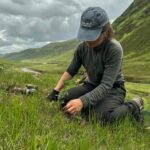
Seventeen SBF recipients from Ecology & Evolutionary Biology, Entomology, Natural Resources & the Environment, Microbiology, and Neurobiology & Behavior
Beatriz Aguirre (Ecology & Evolutionary Biology)

Do Changes in Plant Community Diversity Over Succession Influence Viral Disease Prevalence?
Advisor: Alison Power
Successional aging of plant communities often mediates change in plant community diversity, soil structure, and microbial communities. As plant communities age, plant species diversity is often lost as the community composition shifts to a few dominant species and many rare species. Plant species diversity within a community may influence plant pathogen prevalence by reducing host density. Plant pathogens are common in wild plant communities, and some pathogens, such as many plant viruses, are cryptic. This research will examine whether plant viral prevalence in Solidago (goldenrod) species is driven by changes in plant community diversity along a successional gradient. Understanding how succession and biodiversity influence viral prevalence in wild plant communities will aid in strategy development to mitigate viral spillover to agricultural hosts. This work will also help us understand how to preserve plant community biodiversity and ecosystem functioning in the presence of plant viral pressure.
Montana Airey (Ecology & Evolutionary Biology)
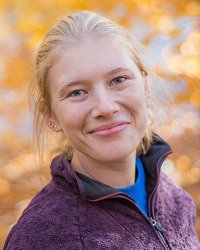
Assessing the Trophic Ecology of Aquatic Benthic Macroinvertebrates Through the Use of δ13C, δ15N, δ2H, and δ34S Stable Isotopes
Advisor: Peter McIntyre
Airey is a community and trophic ecologist who is a Ph.D. candidate in the department of Ecology & Evolutionary Biology. She is working to understand how climate change shapes aquatic communities and their food webs. In temperate regions, global climate change is driving shifts in physical mixing of lake water and lake chemistry that alter food web dynamics. Bottom-living macroinvertebrates such as snails, crayfish, and insects are key links in food chains that move energy sources, like bottom-living algae or free-floating phytoplankton, throughout the food webs. Airey’s research uses stable isotope food web analysis to reconstruct the roles that these invertebrates play in shoreline ecosystems. These findings will enhance understanding of how lake food webs are responding to prolonged seasonal stratification, surface warming, and bottom deoxygenation trends.
Nicholas Cranmer (Ecology & Evolutionary Biology)
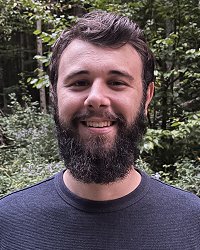
Diversity in Tree Aboveground Biomass Allometry and Its Implications for Forest Carbon Dynamics in Eastern Temperate Forests
Advisor: Xiangtao Xu
The New York Climate Act aims to reduce atmospheric carbon dioxide (CO2) emissions substantially by 2050. Forests will play a key role with an estimated removal of 22.54 MMT CO2 emissions; therefore, understanding forest carbon dynamics is critical for climate adaptation and mitigation. Currently there is large uncertainty in biomass allometric equations, the critical tool for estimating aboveground biomass (AGB). Terrestrial LiDAR provides highly detailed/accurate tree biometrics (e.g., diameter, height, etc.) which can reduce uncertainty in current biomass equations and thus improve carbon stock estimates. Additionally, advancements in individual tree segmentation allow for rapid and precise data collection including biomass allometry variability, which has yet to be fully applied in practice. Cranmer aims to address and reduce uncertainty by utilizing state-of-the-art terrestrial LiDAR to assess the diversity of AGB allometry across riparian forests, an important and understudied forest type in New York, and its implications for carbon dynamics.
Aalayna Rae Green (Natural Resources & the Environment)

The Gendered Socio-Ecological Impacts of Militarized Conservation
Advisor: Shorna Allred
Green’s research examines the gendered and racialized implications of conservation violence in Chobe National Park, Botswana, a part of the Kavango-Zambezi Transfrontier Conservation Area. The use of violent conservation security strategies, such as Botswana’s shoot-to-kill policy, has profound (in)direct effects on people and wildlife. The impacts are largely shaped by systemic and social processes of racialization and gendering, which ultimately influence human-environment relationships. Through interviews with key stakeholders and countermapping socio-ecological borders, Green seeks to propose alternative conservation solutions that are care-oriented and gender-aware.
Hannah Kirkland (Natural Resources & the Environment)
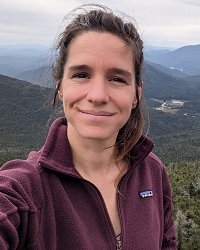
Native Flowering Plants as Indicators of Deer Browse Pressure to Inform Sustainable Deer Management in Scotland
Advisor: Bernd Blossey
Most plant diversity in woodland ecosystems is found on the forest floor. In Scotland, decades of excessive browsing by large populations of red deer, roe deer and non-native sika deer have stripped native woodlands of their diverse herbaceous communities, leaving them dominated by monocultures of less preferred plant species, such as ferns, shrubs, and grasses. To inform sustainable deer management and facilitate woodland recovery, Kirkland will plant seedlings of goldenrod, rosebay willowherb, wood-vetch, red campion, and valerian at five sites in the Scottish Highlands, inside and outside of cages, to experimentally assess the impacts of wild deer on these species. She will simultaneously evaluate the sustainability of these species as indicators of deer browse pressure. Conserving threatened plants and restoring woodland biodiversity through sustainable deer management is only possible with robust data on deer impacts.
Katie Lee (Natural Resources & the Environment)

Perceived Fitness Interdependence: Perspectives of New York State Residents to Deer Management and Predator Reintroductions
Advisor: Bernd Blossey
Lee is a Ph.D. student in Bernd Blossey’s lab in the Department of Natural Resources & the Environment. Her research focuses on developing and testing eco-evolutionary frameworks for how people think about and behave toward wild organisms. Support from this SBF award will be used to empirically investigate how people’s moral psychology promotes pro- or anti-conservation behaviors in the context of deer management and potential reintroduction of native large predators. The proposed research aims to assess whether fitness interdependence, an evolutionary model of adaptive behavior, can be used to explain diverse conservation ethics and behaviors, and inform more effective efforts to conserve biodiversity. Additionally, appealing to different aspects of fitness interdependence may promote more inclusive and equitable conservation outcomes.
Michael Mueller (Entomology)

Context Matters: Examining Fitness Benefits From Plant-to-Plant Communication Along an Old-Field Successional Chronosequence
Advisor: Andre Kessler
Herbivore-induced plant volatiles can trigger induced defensive responses in distal tissues of the same plant or in tissues of neighboring plants. These exchanges of volatile organic compound (VOC)- mediated information, and subsequent metabolic alterations in the receiving plant, are known as plant-to-plant signaling or plant communication. Although this VOC-mediated plant-to-plant information transfer has now been documented for over 30 different plant species, the fitness benefits and so the ecological relevance of this interaction have not been directly assessed. This project will examine herbivore resistance induced by plant-to-plant communication and the resulting fitness outcome for both receiver and emitter as a function of A) community successional stage, B) herbivore density, and C) plant community composition. This study will provide insights into the relative role of phenotypic plasticity and plant behavior in altering population, community, and ecosystem dynamics, and thus how genetic and species diversity is maintained in natural ecosystems.
Cheyenne Reuben-Thomas (Ecology & Evolutionary Biology)
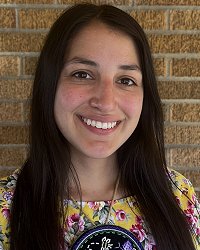
Playing with Fire: Comparing the Effects of Traditional Ecological Knowledge and Settler Colonialism on Insect Diversity
Advisor: Corrie Moreau
Traditional ecological knowledge has helped sustain the world’s largest concentrations of biodiversity on lands stewarded by Indigenous people across the globe. Traditional use of prescribed burning by Indigenous communities, referred to a “good fire,” is one method utilized to increase local biodiversity. Too often, insect biodiversity is neglected when observing outcomes of such land management strategies, even across Indigenous communities. To explore potential benefits of good fire, Reuben-Thomas is collaborating with her home Nation, the Oneida Nation of Wisconsin, and the Yurok Tribe of Northern California to sample insects from good fire sites. Specifically, she will determine its effect on overall insect biodiversity as well as species diversity and genetic variation of ants. Additionally, Reuben-Thomas will investigate the harms of settler land management strategies through sampling insects on paired field sites that are maintained by government agencies. This research has the potential to emphasize the need for Indigenous-led conservation and land management strategies. Cheyenne Reuben-Thomas, she/they/awʌ, is affiliated with the Onʌyoteˀa·ká· (Oneida) and Onöndowa’ga:’ (Seneca) Nations.
Jeferson Ribeiro Amaral (Ecology & Evolutionary Biology)

The Role of Stoichiometry on the Success of Invasive Species in Urban Environments
Advisor: Andrés López-Sepulcre
Although urbanization has been degrading freshwater ecosystems, invasive fish species often manage to navigate these challenges. However, how sewage-derived nutrients affect invasive species’ functional traits is unclear. It’s proposed that invasive species thrive in high-nutrient environments if they exploit increased nutrients for growth and reproduction. To test this, we use the Trinidadian guppy. This species is a well-studied generalist invader worldwide and is found across a wide range of sites in its native range. We sampled females in Trinidad from sites with high and low levels of urbanization and analyzed their stoichiometries. Preliminary results on guppy stoichiometry reveal significant C: element ratio differences between high- and low-urbanization sites in their native range. In urban environments, guppies become more nutrient-rich. Our next step is to analyze this pattern in their invasive range. Understanding the mechanisms behind invasive species’ adaptation to urban environments can help mitigate their impact on freshwater ecosystems.
Bryce W. Robinson (Ecology & Evolutionary Biology)
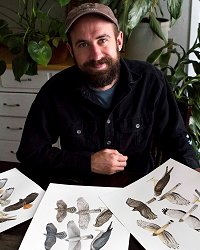
Museomics to Unlock an Understanding of Diversity in the Red-Tailed Hawk (Buteo Jamaicensis)
Advisor: Irby Lovette
In a time of biodiversity crisis, it is critical to understand genetic diversity for effective conservation. Recent advances have enabled perspectives of diversity at reduced effort and cost, creating higher accessibility for conservation genomic work. The red-tailed hawk is a common polytypic raptor with extensive phenotypic diversity across its distribution, yet there has been no work to understand the genomic diversity these phenotypes may represent, largely because the species is difficult to sample and is poorly represented in museum collections. Robinson aims to investigate genomic diversity by sampling all subspecies using a combination of blood samples collected in the field and toepad samples from natural history collections. He will first test a method to extract whole genome data from specimen toepads. This holds the potential to identify important units of biodiversity and to provide a pathway that may unlock the ability for similar work in more imperiled raptors.
Mario A. Sandoval-Molina (Ecology & Evolutionary Biology)
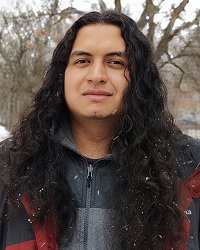
Diversity and Evolution of Plant Defenses in the Mimosa Genus: Thigmonasty, Physical, and Chemical Defenses
Advisor: Andre Kessler
Sandoval-Molina’s research focuses on the study of rapid movements (thigmonasty) in species within the Mimosoid clade of the Fabaceae plant family, particularly in Mimosa plants. These movements are believed to serve as a defense mechanism by exposing protective prickles, deterring herbivore attacks, and reducing herbivory. Sandoval-Molina will investigate the evolution of these defenses, their inducibility, and potential trade-offs among them. His research will use a phylogenetic comparative approach to compare thigmonasty, physical defenses, and chemical defenses within the Mimosa genus, addressing questions about differences in defensive mechanisms between thigmonastic and non-thigmonastic species, as well as their responses to herbivory. This study is crucial for understanding the evolution of thigmonasty and potential trade-offs between different plant defenses, providing insights into the advantages of thigmonasty as a defense mechanism against herbivores in plants.
Linnea Smith (Soil & Crop Sciences)
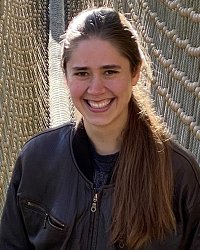
Maximizing Establishment and Benefits of Milkweed by Assessing the Mediation Effects of Belowground Interactions on Plant Chemistry
Advisor: Antonio DiTommaso
Establishing milkweed stands is vital to reversing the population decline of monarch butterflies. A seed pelleting technique allowing farmers to sow milkweed seeds using a standard corn seed drill will overcome a major technological hurdle to the establishment of expansive milkweed stands. However, effects of this seed pelleting innovation on the milkweed rhizosphere microbial community and milkweed latex chemistry (crucial to monarch caterpillars) are currently unknown. This work will investigate how seed pelleting with maltodextrin affects soil microbial composition and function. We will also survey New York state farmers to determine the main factors that will promote or inhibit adoption of this new technology. We will use this knowledge to assess soil legacy effects on milkweed establishment and optimize this technology for use by farmers.
Charles Tebbutt (Natural Resources & the Environment)

Developing Passive Acoustic Monitoring to Evaluate Agroforestry’s Impacts on Bird Biodiversity in the Colombian Amazon
Advisor: Stephen Morreale
Tebbutt’s research examines the social-ecological impacts of agroforestry systems in the post-conflict Colombian Amazon. This key ecological corridor between the Andes and the lowland forest faces land use pressures related to the transition from illicit crops, as well as the impacts of multidimensional poverty and violence. Agroforestry centered around native plant species such as the rubber tree (Hevea brasiliensis) and cacao (Theobroma cacao) offers a potential alternative to environmentally harmful cattle ranching practices that may benefit biodiversity as well as local livelihoods. By combining bioacoustics methods to study birdsong with survey data on peacebuilding indicators, Tebbutt works with the Cornell Lab of Ornithology and local partners to understand the effects of different land uses on people and nature in the world’s second most biologically diverse country.
Leah Valdes (Entomology)
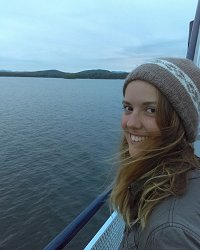
Social Bees and Disease: Bumble Bee Sociality Affects the Distribution of Disease in Diverse Pollinator Communities
Advisor: Scott McArt
Bees provide essential pollination services to terrestrial ecosystems, therefore their decline has broad repercussions for biodiversity. Infectious disease has been widely implicated in these declines, and a better understanding of the ecology of pathogens in plant-pollinator communities is thus a major goal for pollinator conservation. Although theory suggests that social structure can dramatically affect the outcomes of epidemics by altering the patterns of social contacts over which pathogens can spread, to date no empirical study has addressed how sociality affects the distribution and transmission pathogens in wild pollinator communities, which are often dominated by eusocial bee species (Apis mellifera, Bombus spp.). Valdes aims to use complementary observational and experimental studies to 1) characterize how disease is distributed across bumblebee (Bombus impatiens) colonies and 2) determine whether differences in the distribution of disease across colonies affects transmission to other bee species in the broader pollinator community.
Wout van der Heide (Neurobiology & Behavior)

Genetic Coupling of Signal and Preference in a Threatened Soundscape
Advisor: Kerry Shaw
Van der Heide is interested in understanding how evolutionary processes give rise to biological complexity, novelty, and the diversity of life. To explore this, he investigates the genes and behaviors contributing to record-breaking speciation rates of Laupala crickets on the Hawaiian Islands. A focus of van der Heide’s research is the evolution of sexual signal divergence. Signals and preferences are often tightly matched within species, enabling successful mate recognition. Nature is filled with diverse sexual signals, indicating the evolution of new signals and preferences from older, successful communication systems. How do novel sexual signals, potentially leading to reproductive isolation, evolve without eroding successful communication? Van der Heide is also passionate about (Hawaiian) conservation issues, from coral reefs to crickets. Funding from the SBF will be used to research these issues using behavioral assays and molecular tools on Hawaiian crickets.
Evangeline (Angie) Wang (Microbiology)

Investigating Density Dependent Priority Effects in Streptomyces
Advisor: Daniel Buckley
Climate change poses a great threat to soil microbes as it changes environmental conditions that govern microbial community composition. It is important to understand the fundamental mechanisms governing community assembly in order to predict the consequences of such changes. Streptomyces, a bacterial genus that provides critical functions that benefit soils and plants, form spores that can spread widely. However, successful dispersal requires both dissemination and establishment. Wang plans to investigate bacterial colonization mechanisms by utilizing Streptomyces strains that differ in their temperature optima. She hypothesizes that bacterial colonization is governed by density-dependent blocking effects where the coefficient of selection depends on cell density. In this way, stochastic founder effects can prevent the northward dispersal of strains driven by changes in climate. This research aims to better understand bacterial competitive dynamics, which ultimately allows us to better predict soil community responses to climate change.
Xuening (Shirley) Zhang (Ecology & Evolutionary Biology)
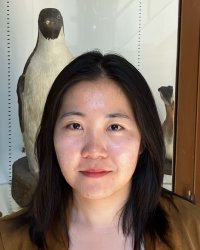
Generalist Floral Syndromes of the Temperate Coreopsideae (Asteraceae): From Multi-Modal Display Traits to Predicting Broad-Scale Pollinator Associations
Advisor: Anurag Agrawal
The study of pollination syndromes has experienced a transformative maturation in recent decades from the descriptive to predictive, and this advance has helped us forecast cascading effects on pollinator and ecosystem functions following local plant invasion or extinction. However, most of the headway has been limited to specialized pollination systems. Zhang’s research proposes to fill this gap for generalist flowers by the floral display traits of the temperate Coreopsideae (Asteraceae). She will further test if consortia of generalist floral traits are predictive of specific pollinator functional groups by using computer vision species identification algorithms. Her proposed research will bridge historically parallel fields in the study of floral evolution, document emergent properties of diverse floral traits, and link such emergent properties to functional pollinator groups. In the long term, her workflow will be scalable to support high-throughput exploration of citizen science data for biodiversity research on plant-animal interactions.
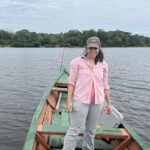
Eighteen SBF recipients from Earth & Atmospheric Sciences, Ecology & Evolutionary Biology, Entomology, Lab of Ornithology, Natural Resources & the Environment, Neurobiology & Behavior, and Soil & Crop Sciences
Udita Bansal (Ecology & Evolutionary Biology)

Cryptic or Colorful: Does Body Coloration at Sleep Sites Confer Protection to Animals at Night?
Advisor: Swanne Gordon
Bansal studies how sleep ecology impacts body color evolution in animals. To date, no study has investigated whether animals use color to protect themselves while sleeping at night. For example, by having darker body colors, animals may be less visible under lunar light conditions. Further, since visibility can also be affected by contrast against their background, animals may choose where they sleep to minimize detection. In this study, Bansal aims to gather empirical evidence about how body color may affect predation risk for animals sleeping at night. She will use predation experiments with clay models of chameleons in their natural habitat. As anthropogenic effects constantly modify natural habitats and increase light pollution, prey may become more vulnerable to predation at night. It is therefore vital to understand how different traits can enable organisms to withstand increasing threats, including those at night.
Ethan Bass (Ecology & Evolutionary Biology)
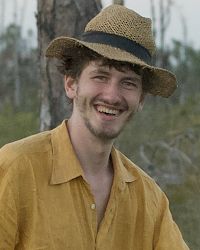
Root Secondary Metabolites as Mediators of Plant-Soil Feedbacks
Advisor: Andre Kessler
Bass is a plant chemical ecologist and Ph.D. candidate working in André Kessler’s lab in the Department of Ecology and Evolutionary Biology. His research focuses on the evolution of root defenses and their cascading effects on plant interactions and community assembly. Support from this SBF award will be used to investigate how plant defensive metabolism contributes to functionally shaping rhizosphere microbial communities in tall goldenrod (Solidago altissima). While interactions with soil microbes are recognized as an important driver of plant community assembly, it is still poorly understood how variation in these microbial community feedbacks is shaped by selection. The proposed project aims to elucidate the mechanisms underlying intraspecific variation in these feedbacks, enhancing our understanding of broad patterns of plant diversity. Additionally, this knowledge could be applied to the development of new strategies to sustainably increase agricultural yields.
Yuqing Chen (Natural Resources & the Environment)

Can Aquaculture Farm Animals Provide an Ecosystem Service by Hybridizing With Native Stocks?
Advisor: Matthew P. Hare
Chen is broadly interested in population genetics, evolutionary genomics, and marine conservation. She is studying the dynamics and consequences of genetic introgression from aquaculture animals to native populations, which depend on the interplay between evolutionary processes and demographic factors. With the support of SBF funding, she will use genomics to measure the extent and geographic pattern of farm to native admixture of Eastern oysters in coastal Connecticut. The study aims to infer factors that affect admixture patterns and assess the fitness impacts of introgression. The findings will inform management agencies about the risks/benefits associated with admixture to support sustainable marine aquaculture.
Cameron Coles (Ecology & Evolutionary Biology)
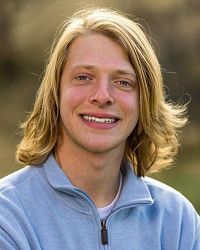
Understanding the Factors Leading to Spongy Moth Defoliation Through the Lens of Remote Sensing
Advisor: Xiangtao Xu
Climate change is likely to amplify insect damages to forest ecosystems. Understanding the key environmental factors governing population dynamics, especially outbreaks, will be critical for predicting how forests will be impacted and properly planning forest management. The consequences of outbreaks can be seen in all parts of the ecosystem ranging from shifting tree species composition; food sources and habitat for organisms within the forest; disturbance regimes; carbon cycling; soil nutrient dynamics; and more. Coles studies the invasive European spongy moth (Lymantria dispar dispar), whose outbreaks can leave forests devoid of leaves. He uses state-of-the-art, high-resolution remote sensing data, supplemented by in situ measurements, to understand the spatiotemporal patterns of defoliation in relation to key environmental factors. Using this information, he plans to incorporate defoliation into computational models to predict long-term impacts to forest structure, function, and productivity.
Hannah Gurholt (Ecology & Evolutionary Biology)
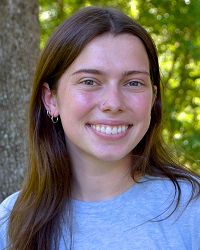
Sex in the (Artificially Lit) City
Advisor: Swanne Gordon
Artificial light at night (ALAN) is a threat to biodiversity because it provides many organisms with false cues of the sun, altering how communities move, behave, and survive. Light pollution either comes directly from streetlights and buildings or indirectly from reflections off the atmosphere. One of the world’s most well-known butterflies, the monarch (Danaus plexippus), has altered its migratory patterns due to false cues from ALAN. Monarchs begin copulation at sunset and mate until sunrise, making their mating behavior vulnerable to ALAN. However, the effect ALAN has on reproduction and fitness of monarchs is unknown. Gurholt will investigate how ALAN shapes monarch development, reproduction, and fitness. Accordingly, she will expose lab-reared monarchs to ALAN conditions and record mating duration, spermatophore transfer, and larval survival. She will use the monarch’s endangered status as a platform to advocate for the reevaluation of multidimensional consequences of artificial light at night.
Juan Pablo Jordán (Ecology & Evolutionary Biology)

Maize Intercropping Systems: Impact of Seed Chemical Treatment on Plant-Rhizosphere Interactions and Their Effects on Resistance to Herbivores and Pathogens
Advisor: Andre Kessler
Jordán’s research is focused on understanding how plant-plant interactions through intercropping mediate resistance to herbivores and pathogens. With SBF funding he will investigate how seed chemical pesticides affect the rhizosphere soil microbiome, interactions with beneficial arbuscular mycorrhizae fungi, and their effect on the production of chemical defenses. The goal is to evaluate the impact of seed pesticides on the interaction network of intercropped maize plants.
Hannah Kirkland (Natural Resources & the Environment)
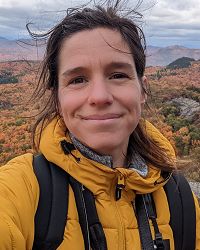
Assessing the Impacts of Deer and Other Stressors on Native Woodlands in Scotland Using the Sentinel Approach
Advisor: Bernd Blossey
Scotland is facing an ecological crisis that sees record high deer populations limiting woodland regeneration, threatening plants and animals and exacerbating climate change. Despite recognition of the damaging ecological impacts of deer, there remain crucial unanswered questions preventing sustainable deer management and the recovery of woodlands across Scotland. Kirkland will apply the sentinel approach, which uses planted saplings as indicators, to study the effect of deer and other stressors on woodlands and identify potential restoration measures that could ameliorate them. She will test whether the sentinel approach, recently developed at Cornell University, is a reliable tool for assessing deer impacts and gauging management outcomes in Scotland. Her research aims to improve outcomes for biodiversity in Scotland by collecting crucial evidence to guide the decisions of practitioners working on deer and woodland management and ministers and public officials responsible for environmental and climate policy.
Kimberly Navarro-Velez (Lab of Ornithology)

Disentangling the Interactions Between Resident and Migratory Birds on Wintering Grounds
Advisor: André Dhondt
Navarro-Velez’s research focuses on the interactions between migratory and resident birds on wintering grounds. In particular, she is interested in testing the hypothesis of migratory species having an impact on the residents. Surprisingly, this has only been explored in a handful of studies. She will incorporate different approaches including habitat occupancy modeling, fecal sampling for metabarcoding, behavioral observations, and morphometrics. By improving our knowledge of the natural history of these species, how and when they interact, and what are the limiting resources, we can guide conservation strategies to mitigate the impact that human activities have on them. Without thorough conservation plans that consider every aspect of the natural history of the species, we cannot assure biodiversity conservation in the long term. This is imperative in the context of climate change, which likely will increase intra and interspecific competition, and thus the likelihood of extinction for many species.
Jaime Ortiz (Natural Resources & the Environment)

Conservation Genomics of the Endangered Brown Sea Cucumber in the Galapagos Archipelago
Advisor: Nina Therkildsen
Ortiz is interested in conservation genomics. Currently, he is developing tools to improve meta-barcoding accuracy for species identification on eDNA and aquaculture feeds. He is very passionate about the conservation of the natural environment. He firmly believes genetic tools can play a more prominent role in driving sustainable policies worldwide.
Jaleigh Q. Pier (Earth & Atmospheric Sciences)
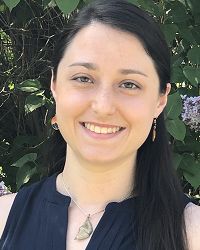
Investigating the Effects of Harvesting on Body Size of the Eastern Oyster, Crassostrea Virginica, Within the Guana River Marsh Aquatic Preserve: a Paleoecological Approach
Advisor: Greg Dietl
Pier is a Ph.D. student in Dr. Gregory Dietl’s lab in the Department of Earth and Atmospheric Sciences. She studies conservation paleobiology, a field that applies paleontological theory and methods toward modern conservation issues. Her research is applying new methods of coring oyster reefs from Guana River within the Guana Tolomato Matanzas National Estuarine Research Reserve (GTM) in northeast Florida. Current oyster monitoring only began in 2014, although the aquatic preserve was established in 1985, when oyster harvest was also prohibited. With funding from SBF, she will date oyster shells within the oyster reef cores to determine reef age and how oyster size has changed over time. This will address information gaps regarding oysters in GTM and help inform management decisions.
Shashank Poudel (Natural Resources & the Environment)
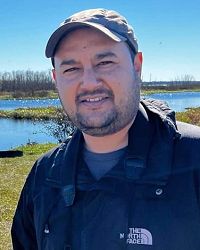
Estimating Leopard Density in Human-Dominated Landscapes in Nepal
Advisors: Angela Fuller & Richard Stedman
In Nepal, increasing attacks on livestock and humans by leopards threatens local livelihoods and results in retaliatory killings of leopards. Leopards account for more than 85% of the total wildlife attacks on humans in the study system. Thus, human-leopard conflict can contribute to leopard population declines and the unwillingness of locals to coexist with leopards. This proposal will supplement the parent research aimed at exploring key drivers and impacts of human-leopard interactions in the Chitwan Annapurna Landscape Nepal to generate adaptive policy interventions for sustainable biodiversity conservation. This proposal will aid in the collection and analysis of data related to leopard abundance and density. The data collected from the Sustainable Biodiversity Fund grant will be synthesized with the existing data on leopard distribution, diet, and social data on conflict collected in 2021/22 to produce a national-level policy document to foster sustainable human-leopard coexistence.
Sylvana Ross (Entomology)

It’s Getting Hot in Here: Thermal Tolerance Across the Urban Gradient of the Ant Species Tapinoma Sessile
Advisor: Corrie Moreau
Global urbanization is creating novel environments that limit genetic diversity and isolate populations that either adapt to or diminish from their new changed environment. To observe the pace of evolution in urban ecosystems, Ross will study how phenotypic plasticity and genetic adaptations allow populations to transition to urban environments. She will study the native North American ant species Tapinoma sessile, where urban colonies are more expansive than rural colonies. In the city, their ability to tolerate the higher temperatures through possible morphological and genetic adaptations may contribute to their urban success. Ross will compare urban and rural populations in cities across the U.S. to see if there are body size or color differences and then look at their DNA to compare molecular differences when they are exposed to urban temperatures. Studying the impact of warming urban temperatures can give insight into how the global climate crisis impacts vulnerable populations and ecosystems.
Peter Searle (Ecology & Evolutionary Biology)
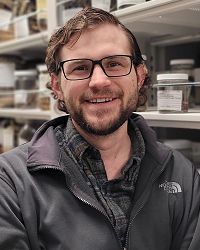
The Evolution and Maintenance of Biodiversity in Rockfish (Sebastes): Depth Segregation and Coloration
Advisor: Swanne Gordon
Searle is interested in what ecological and evolutionary processes allowed rockfish (Sebastes) to diversify into more than 110 marine species. Using whole genome sequences, as well as a phylogenetic comparative approach, he will test if depth segregation and coloration are important mechanisms associated with the evolution of these fishes. Rockfish are an important food source that have been intensely fished both commercially and recreationally. Overfishing has resulted in significant range contractions, biomass declines, and population collapses. Understanding what drove the evolution of rockfish species in the past will inform how rockfish species will respond to future anthropogenic impacts.
Raunak Sen (Neurobiology & Behavior)

Understanding the Origins and Maintenance of Cryptic Biodiversity
Advisor: Kerry L. Shaw
Sen is broadly interested in how biodiversity is generated. Specifically, he is working on a clade of Hawaiian crickets of the genus Laupala to understand how new species form. This genus has the fastest speciation rate in invertebrates and is morphologically cryptic but differ in their sexual signals, making it a great model system for speciation studies. He is trying to understand the origins and maintenance of reproductive isolating barriers between species in this genus. Using a combination of behavioral ecology experiments, population genomic analysis of sequence data and ecological methods, he wants to understand the extent to which they are reproductively isolated, the genomic basis of these barriers and the role of ecological differentiation in this radiation.
Carl St. John (Natural Resources & the Environment)
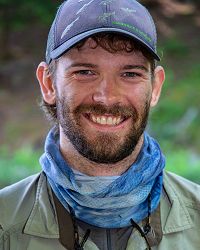
Population Genetics and Local Adaptation in Alaskan Red King Crab to Inform Stock Enhancement
Advisor: Peter B. McIntyre
Fisheries are the largest mass harvested, wild food source on Earth. They help feed billions of people and support tens of millions of livelihoods. Marine species in general face threats to their persistence from a multitude of recent ecological changes, and for commercially harvested arctic species, those threats are compounded by fishery mortality and oceanic warming. Red king crab (Paralithodes camtschaticus) is a culturally and economically important invertebrate fishery in Alaska that has declined in abundance leading to localized fishery closures. Alaskan fishery managers are considering stocking red king crabs across Alaska but are concerned about the genetic risks of stocking into wild populations. Population genetic investigations in St. John’s proposed work will assess these risks and provide crucial information on how to sustainably stock red king crabs in Alaska, hopefully leading to a recovery of the fishery and preservation of the ecosystem and communities that depend on it.
Charles Arthur Tebbutt (Natural Resources & the Environment)

Assessing the Social-Ecological Value of Artisanal Rubber Agroforestry for Biodiversity and Peacebuilding in the Colombian Amazon
Advisor: Shorna Allred
Tebbutt’s research examines the social-ecological impacts of agroforestry systems in the post-conflict Colombian Amazon. This key ecological corridor between the Andes and the lowland forest faces land use pressures related to the transition from illicit crops, as well as the impacts of multidimensional poverty and violence. Agroforestry centered around native plant species such as the rubber tree (Hevea brasiliensis) and cacao (Theobroma cacao) offers a potential alternative to environmentally harmful cattle ranching practices that may benefit biodiversity as well as local livelihoods. By combining bioacoustics methods to study birdsong with survey data on peacebuilding indicators, Tebbutt works with the Cornell Lab of Ornithology and local partners to understand the effects of different land uses on people and nature in the world’s second most biologically diverse country.
Marisol Patricia Valverde Montellano (Ecology & Evolutionary Biology)

What Can Soundscapes Tell Us About Tropical Freshwater Community Dynamics?
Advisor: Alexander Flecker
The study of freshwater soundscapes, which comprise the biological (biophony), geophysical (geophony) and anthropogenic (anthrophony) sounds from a given area, is an emerging research area in aquatic ecology and provides a novel way of addressing ecological and biodiversity questions in freshwater habitats. These habitats are home to a variety of underwater sound-producing organisms, including fishes, which are the vertebrate group with the highest diversity of sound-producing mechanisms. In this project, based in the Brazilian Amazon, Montellano propose to use passive acoustic monitoring to investigate how the soundscape is structured and partitioned by species-rich tropical fish communities. This work will increase the understanding of fish population and community dynamics in the Amazon and set the stage for the development of a new tool for the monitoring and conservation of Amazonian freshwaters.
Sophie Westbrook (Soil & Crop Sciences)
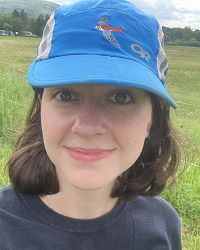
Restoring Biodiversity and Ecosystem Services to Agricultural Landscapes: Are Annual Flower Strips the Answer?
Advisor: Antonio DiTommaso
Flower strips increase agroecosystem biodiversity at multiple trophic levels. This practice does not require major agroecosystem redesign or yield losses, so theoretically it is available to many growers. However, despite established literature on flower strips and subsidies available in the United States and Europe, this practice is not widely adopted. Westbrook’s research seeks to identify flower strip systems that are both effective and more accessible than standard systems. The work will focus on preserving growers’ management flexibility by requiring only a single year’s commitment and avoiding in-season field operations. It also will explore how delayed planting and landscape context modify the effects of flower strips. These findings will enable Northeastern growers to make accurate, site-specific predictions about the costs and benefits of flower strips.
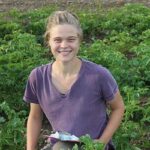
Twelve SBF recipients from Earth & Atmospheric Sciences, Ecology & Evolutionary Biology, Entomology, and Natural Resources & the Environment
Hayden Bock (Entomology)
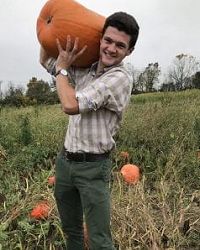
Establishing Connections Between Animal Biodiversity, Ecosystem Services, and Disturbance in Urban Soil Ecosystems
Hayden Bock is a Ph.D. student in Dr. Kyle Wickings’ Soil Arthropod Ecology Lab in the Department of Entomology. His research leverages urban ecosystems to investigate the spatial ecology and functional diversity of soil organisms, and how those patterns can be harnessed to enhance our understanding of biogeochemical processes like carbon cycling in human-altered areas. He plans to utilize SBF funding to undertake a project aimed at quantifying the effects of human disturbance in lawn systems and its impacts on soil biodiversity and soil function over time. He expects that this project will yield basic knowledge on the disturbance ecology of numerous soil biota along with practical management takeaways that can be communicated to park managers, homeowners, and others looking to maximize the biodiversity and overall sustainability of their lawns.
Mark Buckner (Entomology)
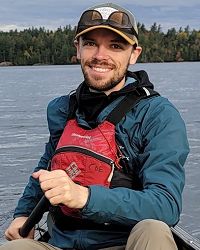
Modeling the Combined Effects of Urbanization, Solar Development, and Climate Change on Bee Biodiversity in the Mojave and Sonoran Deserts of the American Southwest
Mark Buckner is a Ph.D. student in Dr. Bryan Danforth’s lab in the Department of Entomology. He is interested in how species distributions respond to climate and environmental change and how climate-driven range shifts impact biodiversity. His research uses spatial modeling to leverage museum and field collections data to understand how solitary bees respond to their changing environments. With SBF funding, Mark will explore how the combination of climate change, urbanization, and solar energy development in the American Southwest will affect bee species richness. The Desert Southwest – a region of peak bee biodiversity – is threatened by rapid environmental change resulting from prolonged droughts, urban sprawl, and the development of natural areas to meet our growing renewable energy demand. Combined with ongoing research on the impact of solar development practices on bee assemblage, this project aims to provide a resource for policy and land management decision-makers regarding sustainable development in the region.
Julie Davis (Entomology)
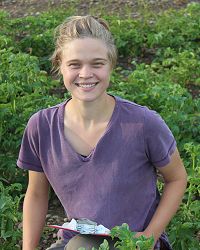
Examining Effects of Soil Management Legacy and Crop Disease on Pollinator Health
Julie Davis is a Ph.D. candidate in Dr. Jennifer Thaler’s lab in Entomology, interested in the ecology of pollinators, herbivores, and plant pathogens in natural and agricultural ecosystems. With support from SBF funding, she will evaluate how on-farm soil management practices affect crop pathogen resistance, bee diet quality, bee fitness, and pollination services. She will use observational and manipulative studies to identify potential mechanisms of bottom-up drivers of ecosystem services. This work seeks to inform management plans that support both crop health and robust pollinator populations.
Nicholas Dietschler (Ecology & Evolutionary Biology)
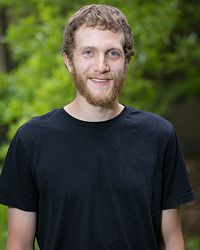
Biological Control of the Hemlock Woolly Adelgid: Optimizing Predators to Preserve Eastern Forests
Nicholas Dietschler is a Ph.D. Student in Dr. Anurag Agrawal’s Lab in the Department of Ecology and Evolutionary Biology. His research focuses on hemlock woolly adelgid (HWA) management with the goal of conserving eastern hemlock forests on the east coast of North America. With support from SBF Nick will investigate the phenology, niche differentiation, and interactions of three HWA biological control predators from the native western North American Range at multiple scales. The goal of this study is to inform management practices in HWA’s introduced range, increasing the efficacy of pest management to preserve hemlock forests.
Stephanie Freund (Ecology & Evolutionary Biology)
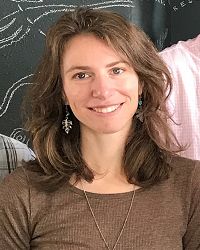
Nitrogen Uptake by Imperiled Northern Forest Tree Species: Relationships to Traits, Seasonality, and Global Change
Stephanie Freund is a Ph.D. student in Christine Goodale’s lab in the Department of Ecology and Evolutionary Biology. She is interested in links between plant ecology and biogeochemical cycles – in particular, how species’ traits, climate, and soil nutrient availability influence the ecosystem functions of trees. With SBF funding, she is quantifying winter nitrogen uptake by a variety of tree species of the northern temperate forest. This work will provide new data to inform model estimates of seasonal nitrogen losses from these ecosystems, and it will aid our understanding of the potential responses of nutrient cycles to regional species decline and species compositional change due to invasive pests, climate change, and calcium depletion.
Azwad Iqbal (Natural Resources & the Environment)

Investigating the Genomic Basis of Rapid Adaptation in an Invasive Migratory Fish
Azwad Iqbal is a Ph.D. student in Nina Therkildsen’s lab in the Department of Natural Resources and the Environment. Azwad is broadly interested in studying rapid evolution and conservation using genomic tools. He is currently working on a study investigating the genomic basis of invasion success and local adaptation in American Shad, an invasive migratory fish. By leveraging whole-genome sequencing techniques, Azwad aims to understand the molecular basis of local adaptation and rapid expansion along the species’ invasive range. Funding from the SBF will help Azwad conduct a genomic survey of invasive Shad populations across a steep thermal gradient by collaborating with regional and indigenous fisheries management agencies.
Ashley Jernigan (Entomology)

Soil Microarthropods: Sustainable Plant-Pathogen Control?
Ashley Jernigan is a Ph.D. candidate in Kyle Wickings lab in the Department of Entomology. Her research focuses on how soil microarthropod and microbial community interactions impact plant growth and development. Funding from SBF will be used to investigate the interactions between soil microarthropods and plant pathogens. This project aims to understand the spatial dynamics of these relationships and how multi-trophic interactions in microarthropod communities influence their effects on plant-pathogen dynamics. The findings from this research will help inform our understanding of how soil microarthropods may serve as sustainable plant pathogen control in agricultural systems.
Alyssa Kaganer (Natural Resources & the Environment)
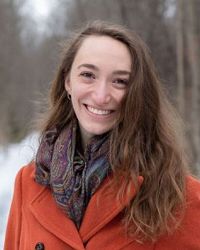
There’s Something in the Water! Improving Emerging Infectious Disease Surveillance With Environmental RNA
Alyssa Kaganer is a postdoctoral associate working with Dr. Krysten Schuler at the Cornell Wildlife Health Lab in the Department of Public and Ecosystem Health. Her research focuses on the development and application of novel molecular tools to advance surveillance and management of free-ranging wildlife and their pathogens. She specializes in non-invasive and minimally invasive techniques to inform host-pathogen dynamics in emerging infectious disease (EID) systems. Support from the SBF will enable Alyssa to evaluate the potential for environmental RNA (eRNA), genetic material shed by hosts and pathogens into their environment, to advance noninvasive monitoring of EID pressure from the viral pathogen ranavirus on susceptible amphibian host populations.
Yixin Ma (Ecology & Evolutionary Biology)

Quantifying Leaf Angle Diversity Across Light Gradients and Its Importance on Ecosystem Functioning Using Terrestrial LiDAR and Process-based Modeling
Yixin Ma is a Ph.D. student in Xiangtao Xu’s lab in the Department of Ecology and Evolutionary Biology. She is broadly interested in plant functional diversity and life history strategy. Her research integrates plant ecophysiology and vegetation models to understand mechanisms and the impact of plant response to the environment at different ecological scales. Her current project focuses on light-driven trait plasticity. Funding from the SBF will allow her to use terrestrial laser scanning to investigate leaf angle diversity, specifically, light-driven plasticity of leaf angle and its impact on ecosystem productivity. This project will complement the classic framework of morphology and physiology-based plant life history strategy with novel structural trait data. It will also be a critical step towards understanding how structural diversity may influence ecosystem functioning.
Matthew Pruden (Earth & Atmospheric Sciences)

Examining the Effects of Environmental and Climate Change on Ecological Quality in Long Island Sound Using the Geohistorical Record: A Pilot Study
Matthew Pruden is a Ph.D. student in the Department of Earth and Atmospheric Sciences studying conservation paleobiology under Dr. Gregory Dietl. His research is focused on examining the effects of environmental and climatic change on the ecological quality of estuarine systems using fossil and recent molluscan assemblages. The SBF award will be used to radiometrically date molluscan shells from sediment core samples taken from Western Long Island Sound (WLIS), which will allow him to assess changes in the ecological quality in WLIS throughout the past several centuries.
Hayley Schroeder (Entomology)

Testing the Adaptive Potential of Plants in Modified Landscapes and the Role of Insects as Selective Agents
Hayley Schroeder is a Ph.D. candidate in Dr. Katja Poveda’s lab in the Department of Entomology. She is investigating how the conversion of natural landscapes to agriculture alters insect interactions with wild plants, changing the evolutionary trajectories of plants persisting in modified landscapes. The loss of natural habitats is currently one of the greatest threats to biodiversity worldwide, transforming ecosystems and the communities within them. With the SBF grant, Hayley will investigate how land-use change is altering natural communities by examining changes in community interactions and the consequences for evolution in plant traits. The results of this work will demonstrate what plant trait phenotypes are adaptive in low diversity landscapes and provide evidence of the adaptive potential for plants within modified landscapes.
Meredith Theus (Ecology & Evolutionary Biology)

Effects of Primary Producer Diversity on Freshwater Greenhouse Gas Fluxes
Meredith Theus is a Ph.D. student in Meredith Holgerson’s lab in the Department of Ecology and Evolutionary Biology. She is interested in understanding how populations and communities influence greenhouse gas (GHG) emissions from freshwater systems. With SBF funding, Meredith will investigate the influence of plant and phytoplankton communities on GHG fluxes in ponds. Understanding the effects of primary producers on GHG emissions will not only allow for the development of more carbon-friendly reservoirs and agricultural ponds but will also inform aquatic restoration to minimize GHG release by manipulating phytoplankton and plant biodiversity.

Twelve SBF recipients from the Cornell Lab of Ornithology, Ecology and Evolutionary Biology, Global Development, Integrative Plant Science, and Microbiology
Beatriz Aguirre (Ecology and Evolutionary Biology)

Beatriz Aguirre is a Ph.D. student in Alison Power’s lab in the Department of Ecology and Evolutionary Biology. She is interested in understanding how biodiversity may reduce the prevalence of disease in ecological communities. The SBF grant will enable Beatriz to study how functional diversity and grass types may be contributing to the dilution of virus prevalence in plant communities. Understanding how diversity contributes to this dilution effect of plant viruses will further our understanding of the biodiversity-disease relationship and will allow us to gain knowledge on how to mitigate disease and preserve ecosystem function.
Emily Baker (Global Development)
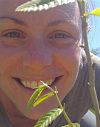
Emily Baker is a PhD student in Rachel Bezner Kerr’s lab in the Department of Global Development. She is interested in linking multi-scalar socio-environmental change with the knowledge systems and socio-cultural dynamics that shape in situ conservation of agricultural biodiversity. Her SBF research will focus on determining the ways that protracted conflict and climate change affect gendered knowledge; farm management practices; and agrobiodiversity in agroforestry, home gardens, and wildcrafted areas in the eastern Democratic Republic of the Congo and western Uganda. Emily is particularly interested in participatory approaches that center local knowledge and priorities to inform policy and community decision-making for biodiversity conservation, food security, and adaptation strategies.
Ethan Bass (Ecology and Evolutionary Biology)
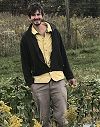
Ethan Bass is a plant chemical ecologist and PhD candidate working in Andre Kessler’s lab in the Department of Ecology and Evolutionary Biology. His research focuses on chemical interactions in the root-zone and their role in shaping the composition of microbial and especially plant communities. Funding from SBF will be used to investigate the effects of soil microbes on plant competition in Northeastern old-field communities and how community context affects the strength of these “plant-soil feedbacks.” This project aims to improve our understanding of the basic mechanisms underlying plant species coexistence, with applications to the conservation and restoration of biodiversity as well as invasive species management.
Michael Cary (Global Development)

Michael Cary is a Ph.D. student in Dr. Wendy Wolford’s lab in the Department of Global Development. His research examines the political and cultural dimensions of food, agriculture, and conservation in Latin America, focusing on the socio-ecological dynamics of land use change in the Bolivian lowlands. With SBF funding, Michael will explore the links between anthropogenic forest fires, land tenure security, and agrarian frontier expansion in Bolivia’s Chiquitano dry forest.
Liang Cheng (School of Integrative Plant Science)

Liang Cheng is a Ph.D. candidate in Jenny Kao-Kniffin’s lab in the School of Integrative Plant Science. His dissertation focuses on negative plant growth responses mediated by soil microbiome and natural product discovery. Liang’s preliminary data suggested the growth response of the native ragweed (Ambrosia artemisiifolia L.) to soil inoculations from conventional and organic farms differed significantly. With the SBF funding, he will investigate the role of soil microbial diversity and root exudates in regulating the contrasting negative growth responses. This study will help understand the role of root exudates in contributing to negative plant growth and how microbial diversity could mediate the plant-soil feedback responses. The information could also provide novel insight into the development of unconventional integrated weed management strategies.
Ethan Duvall (Ecology and Evolutionary Biology)

Ethan Duvall is a PhD student in Alex Flecker’s lab in the Department of Ecology and Evolutionary Biology. He is studying avian ecology with interests in ecological stoichiometry and nutrient cycling. His research links bird biology with ecosystem functioning and biogeochemistry to understand the extent that birds influence biogeochemical cycles at various scales. SBF funding will allow Ethan to quantify the global nutrient dispersal and recycling services provided by birds and the potential consequences of bird biodiversity loss on ecosystem functions such as primary productivity.
Wendy Erb (Cornell Lab of Ornithology)

Wendy Erb is a postdoctoral researcher in the Center for Conservation Bioacoustics at the Cornell Lab of Ornithology. She is researching human-environment interactions in East Kalimantan, at the site of a historic climate-based migration. Indonesia is transitioning its sinking, flood-prone capital from densely-populated Java to forest-rich Borneo, where corporations and indigenous and migrant communities practice diverse land uses amidst critical climate-mitigating, endangered species habitats. With multidisciplinary collaborators and community partners, our international team will take a community-to-landscape-level approach to: 1) capture communities’ place-based knowledge and perceptions of the migration’s impact, 2) map biodiversity and soundscapes across the planned city location and surrounding landscape, and 3) develop community-led social-ecological monitoring programs that integrate soundscapes and place-based knowledge. Through Indonesian partners, we will share results with planning agencies to advise policy on how to minimize detrimental ecological and social impacts and advance the goal of developing a sustainable “forest city.”
Adriana Hernandez (School of Integrative Plant Science)

Adriana I. Hernandez is a Ph.D. Candidate in Chelsea Specht’s lab in the Plant Biology Section of the School of Integrative Plant Science. As an integrative evolutionary biologist, she investigates fundamental principles at the intersection of population genetics, evolutionary history, landscape, and ecology. She is leveraging a California endemic lily, Calochortus venustus, that exhibits highly polymorphic floral forms and variation in the degree of polymorphism across populations to identify mechanisms of adaptive diversification at subpopulation and metapopulation scales. The SBF will be used to identify the ecological mechanisms and functional traits that maintain striking phenotypic diversity and to establish a baseline of ecological data for this hypervariable species. Adriana will test across hypotheses of pollinator preference and constancy, floral phenology, and a heterogeneous landscape of physical environmental variables that could underlie floral diversity and drive local adaptation.
Sabrina McNew (Ecology and Evolutionary Biology and Cornell Lab of Ornithology)

Sabrina McNew is a Rose Postdoctoral Fellow working with Irby Lovette and Maren Vitousek in the Department of Ecology and Evolutionary Biology and Lab of Ornithology. She studies the effects of introduced parasites and pathogens on birds in the Galápagos Islands. Sabrina’s research integrates field experiments, cutting-edge genomics, and community education to understand and mitigate emerging threats to endemic island birds. Her current focus is on how avian pox virus affects gene expression in two species of Darwin’s finches. Funding from the SBF will allow her to investigate whether conserved genetic differences between species underlie their different responses to infection. The results from this project will help explain why some species are more susceptible to emerging diseases than others in the same community.
Jasmine Star Peters (Ecology and Evolutionary Biology)

Jasmine S. Peters is a PhD student in Dr. Alison Power’s lab in the Department of Ecology & Evolutionary Biology. Jasmine’s work integrates applied ecological and social science methods. Her research explores the intersection of plant community and disease ecology, ecological restoration, and stewardship practices in coupled human-natural systems. The SBF award will support Jasmine’s research into how prescribed burns may influence viral plant pathogen prevalence and plant community dynamics in restored and remnant eastern prairie grasslands.
Jordan Rede (Microbiology)

Jordan Rede is a Ph.D. student in the Department of Microbiology under Ian Hewson. He currently studies seagrass associated microbes and seeks to understand the relationship between microbial ecology, biogeochemical cycling, environmental stress, and seagrass health. With support from the Sustainable Biodiversity Fund, Jordan will use a combination of amplicon sequencing and metagenomics to monitor microbial communities associated with Zostera marina in a eutrophic environment. Jordan hypothesizes that increased phytoplankton productivity will create more favorable conditions for anaerobic bacteria that produce sulfide, a toxic gas that is linked to seagrass declines. Jordan hopes that his work will aid the formulation of restoration and management strategies for vulnerable seagrass populations.
Vivianna Sanchez (Microbiology)

Vivianna Sanchez is a Ph.D student in Tory Hendry’s lab in the Department of Microbiology. She is interested in the microbial ecology and evolution of Acinteobacter spp. in floral and pollinator environments. She is currently studying the functional capabilities of Acinetobacter spp. and their role in solitary bee pollen provisions. Support from the SBF will fund next-generation sequencing efforts to determine the diversity and functional capacity of bacteria present in local solitary bee pollen provisions. Understanding the bacterial structure and genomic composition in pollen provisions will help elucidate the presence and role of Acinetobacter spp. in solitary bee-associated environments. Genomic insight from the microbial community present in larval food sources could also suggest possible ecological roles floral microbes have on foraging pollinators, namely solitary bees.
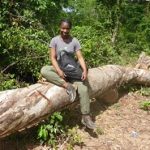
Twelve SBF recipients from the Cornell Lab of Ornithology, Ecology and Evolutionary Biology, Entomology, Horticulture, Microbiology, and Natural Resources
Lillian Aoki (Ecology and Evolutionary Biology)
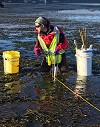
Lillian Aoki is a postdoctoral researcher working in Drew Harvell’s lab in the Department of Ecology and Evolutionary Biology. She is researching the drivers of ecosystem function, especially in the context of human activity and global change. Her focus is on seagrass meadows—underwater grasslands that are key biodiversity hotspots. With partners from seven other institutions, Lillian is investigating the environmental drivers of seagrass wasting disease, an infectious pathogen that can cause widespread declines in seagrass meadows. Funding from the SBF will enable her to experimentally test several management strategies for reducing wasting disease infections. The results will support efforts to minimize wasting disease outbreaks in both natural and restored seagrass meadows.
Tyler Coverdale (Ecology and Evolutionary Biology)

Tyler Coverdale is a Presidential Postdoctoral Fellow working with Anurag Agrawal in the Department of Ecology and Evolutionary Biology. His research uses community ecology and evolutionary approaches to understand the diversity of plant defense strategies, from individual genes to entire plant communities. Funding from the SBF will allow Tyler to investigate how the extinction of large African herbivores—and their replacement with livestock—will affect the diversity of savanna plant communities. Tyler will use phylogenetic comparisons, large herbivore exclosures, and small-scale manipulative experiments to explore how physically defended plants respond to the loss of native browsers. Combined with his previous work in East Africa, this project seeks to understand how resilient plant communities are to dramatic changes in the diversity, abundance, and identity of large mammalian herbivores.
Julie Davis (Entomology)
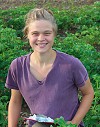
Julie Davis is a PhD student in Dr. Jennifer Thaler’s lab in Entomology, interested in using basic ecological principals as a means to improve sustainable farming practices. Her SBF research examines how crop diversity mediates plant species interactions with beneficial and antagonistic insects. Specifically, she will identify mechanistic effects of tomatillo trait variation on crop resistance to herbivores, and evaluate how trait variation affects pollination services. This work will provide necessary information on traits and cultivars best suited for sustainable crop production, and exemplify the importance of crop biodiversity conservation.
Anna DiPaola (Ecology and Evolutionary Biology)

Anna DiPaola is a Ph.D. student in Sunny Power’s lab in the Department of Ecology and Evolutionary Biology. She is interested in how biodiversity in cropland and in fragments of natural habitat affect populations of agricultural insect pests and their natural enemies. Her research will focus on smallholder farms in Ethiopia affected by the fall armyworm, Spodoptera frugiperda, an invasive moth pest which causes severe damage to maize in sub-Saharan Africa. SBF funding will allow her to examine how on-farm crop diversity and landscape composition relate to the diversity of the predator and parasitoid communities controlling the fall armyworm in southwestern Ethiopia. SBF funding will also allow her to work closely with Ethiopian farmers and with researchers at Addis Ababa and Jimma Universities.
Sudan Kariuki (Ecology and Evolutionary Biology)
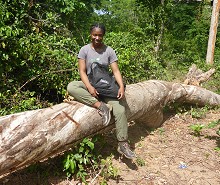
Sudan Kariuki is a Ph.D. student in Jed Sparks’ lab in the Department of Ecology and Evolutionary Biology. She is interested in using biogeochemistry to understand how plant and soil communities respond to human activity. Her SBF award will support a study on microclimatic factors required for native tree restoration in sacred dry tropical forests of coastal Kenya. Developing a deeper understanding of native trees’ microclimatic needs will help support ongoing propagation efforts and provide important foundational knowledge of the ecology of an understudied and threatened system. Learn more at sudankariuki.com.
Shanthanu Krishna Kumar (Horticulture)

Shanthanu Krishna Kumar is a Ph.D. student in the section of Horticulture, School of Integrative Plant Science, working with Gregory Peck. His goal is to enhance biodiversity in cider apple production, increasing the concentration of polyphenols, micronutrients more common in older cider apple cultivars, which are lower in newer apple varieties due to supply chain consolidation and changing consumer preference. With support from SBF, he plans to identify genetic markers for polyphenolic compounds which can be used in apple breeding programs to identify and utilize the polyphenolic diversity present in apples.
Josephine Martell (Natural Resources)

Josephine Martell is Ph.D. student in Amanda Rodewald’s lab in the Department of Natural Resources studying how message framing can influence wildlife conservation-related policy and decision making. Her research examines how messages about biodiversity and conservation are received by key stakeholders. Through a national survey, this project will assess which biodiversity and conservation frames are most persuasive on public policy, advocacy, fundraising, and personal behavior change for conservation. This work is part of a bigger research project that will include follow-up interviews with federal legislators and staffers to test which messages effectively influence public policy decision making and political advocacy efforts.
Hayley Schroeder (Entomology)

Hayley Schroeder is a Ph.D. student in Katja Poveda’s lab in the Department of Entomology. She is investigating if landscape-mediated changes in insect diversity and abundance alter selection on plant traits associated with defense and reproduction in wild plants growing in farming ecosystems. Landscape simplification is currently one of the greatest threats to biodiversity worldwide, transforming ecosystems and the communities within them. With the SBF grant, Hayley will use a landscape simplification gradient as a framework to study the importance of insect biodiversity for plant fitness and as an agent of selection for plant traits. This study will show if plants are able to adapt to low diversity landscapes and even predict how plant functional diversity will shift in the future.
Melanie Smee (Microbiology)
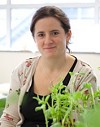
Melanie Smee is a postdoctoral associate in Tory Hendry’s lab in the Department of Microbiology. She is interested in how plant-insect-microbe interactions affect biodiversity conservation and impact sustainable agriculture. Her research is interdisciplinary, using methods drawn from ecology, evolution, entomology, genomics, and microbiology to break down big questions into smaller building blocks. Her current work focuses on how growth of the common bacterial plant pathogen Pseudomonas syringae on plant surfaces kill aphids, a significant agricultural pest. Funding from the SBF will allow Melanie to delve deeper into community-level interactions on plant surfaces. With the help of an undergraduate summer intern, she will develop a synthetic community of bacterial strains found on crops and investigate how their interactions with pathogens affect other insect pests. Ultimately, this research will help inform sustainable strategies for pest management.
Jenny Uehling (Ecology and Evolutionary Biology)
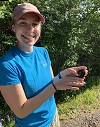
Jenny Uehling is a Ph.D. candidate in Maren Vitousek’s lab in the Department of Ecology and Evolutionary Biology. A behavioral ecologist, she studies bird movement, foraging ecology, and stress physiology. Currently, she is focusing on tree swallows, aerial insectivores that nest in human-provided nest boxes. Tree swallows, along with other aerial insectivores, are declining in North America. With support from the SBF, Jenny will determine how tree swallow nestlings’ diets vary across a gradient of agricultural intensities and habitat types and explore how the types of insects in nestling diets relate to their condition and survival. She will also explore how aerial insect abundance and diversity differs across sites. This work will shed light on possible reasons behind the decline of aerial insectivores and will characterize how land use affects insect diversity. In turn, this will identify possible priorities for habitat conservation to protect both aerial insectivores and their insect prey.
Marisol Valverde (Ecology and Evolutionary Biology)

Marisol Valverde is a Ph.D. student in Alex Flecker’s lab in the Department of Ecology and Evolutionary Biology. She is interested in the ecology and conservation of freshwater ecosystems, especially those in tropical regions. In particular, she studies how tropical freshwaters are affected by human impacts, such as flow modification, overharvesting, and species introductions, linking ecological and social research (e.g., biodiversity and ecosystem services). With support from the SBF, Marisol will investigate the impacts of hydropower development in a tropical river basin in Mexico and work towards designing a framework for its sustainable management. This research seeks to contribute to the conservation efforts of tropical rivers, which despite sustaining some of the highest levels of aquatic biodiversity are facing growing anthropogenic pressures.
Jen Walsh (Cornell Lab of Ornithology)

Jen Walsh is a postdoctoral researcher in Irby Lovette’s lab at the Cornell Lab of Ornithology. She is interested in utilizing genomic approaches to address questions relating to the evolution, behavior, and conservation of birds. Jen’s research focuses on understanding the genomics of local adaptation of song sparrows spanning harsh ecological gradients and the development of genomics tools for incorporating museum specimens more broadly in avian research. With funding from the SBF, she will use museum specimens to establish pre-decline baselines of genomic diversity in six species of warblers. This work will help identify losses in genetic diversity over time and can help identify those populations most at risk of reduced capacity for adaptation in the face of environmental change.
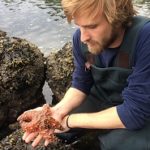
Fourteen SBF recipients from Applied Economics and Management, Atmospheric Science, Development Sociology, Ecology and Evolutionary Biology, Entomology, Horticulture, Microbiology, Natural Resources, Plant Biology, and Soil and Crop Sciences
Heath Cook (Ecology and Evolutionary Biology)
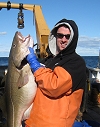
Heath is a Ph.D. student working with marine fishes in Willy Bemis’ lab in the Department of Ecology and Evolutionary Biology. He is interested in marine biomonitoring and developing methods to overcome the ever-present difficulties in sampling biodiversity on the continental shelf, particularly in regions of the world with reduced marine research infrastructure and budgets. Using funding from SBF, he aims to investigate environmental DNA (eDNA) metabarcoding in marine systems as a tool for the detection of continental shelf biodiversity and species ranges. While still in their infancy in marine environments, the developing methods and technology associated with eDNA have the potential to revolutionize marine biomonitoring and provide major advances in the conservation of global fisheries and marine biodiversity hotspots.
Stephanie Enloe (Development Sociology)

Stephanie Enloe is a PhD student in Dr. Rachel Bezner Kerr’s lab in the Department of Development Sociology. Her work explores how farmer knowledge systems interact with multi-scalar political-ecological forces to generate differential usage of agroecological farming approaches. She is embedded in a transdisciplinary project in northern Malawi that draws on participatory methods to explore how agroecological systems impact arthropod and bird biodiversity. Stephanie is particularly interested in applied research wherein researchers and practitioners co-construct strategies to preserve biodiversity while bolstering farmer well-being.
Maria Gannett (Horticulture)
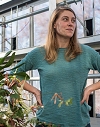
Maria Gannett is a Ph.D. student in Horticulture, working with Dr. Jenny Kao-Kniffin and Dr. Toni DiTommaso. She is interested in how manipulating the soil chemical environment can alter plant competition and how the soil microbial community mediates this effect. With support from SBF she will explore the idea of improving competition of crops that form microbial symbiotic relationships by adding high carbon amendments to soil, which would immobilize nitrogen by stimulating soil microbial growth. Since many agricultural weeds are less competitive in soils with lower nitrogen availability, this idea has the potential to be used as a weed management tool. By beginning to tease apart the mechanisms of plant competition in low and high nitrogen environments she hopes to understand the situations where this technique is successful. Ultimately her goal is to expand and refine sustainable weed management techniques using ecological knowledge.
Joshua Garcia (Horticulture)

Joshua Garcia is a PhD student in the School of Integrative Plant Science working in Dr. Jenny Kao-Kniffin’s lab. His research focuses on the effect of soil microorganisms on crop traits such as yield and nutrient use efficiency. Joshua’s research is highly integrative and he utilizes research techniques from various disciplines including soil science, microbiology, and molecular biology. With SBF funding, Joshua is completing a project investigating how agroecosystem nitrogen dynamics may be improved through crop diversification. This work will help develop more sustainable agroecosystem management practices and yield insight into the links between biodiversity and ecosystem services.
Mia Howard (Plant Biology)

Mia Howard is a Plant Biology PhD candidate studying the chemical ecology of microbe-plant-insect interactions in André Kessler’s lab. She is interested in how soil microorganisms affect the ability of plants to defend themselves against insect herbivores. Her dissertation work has largely focused on the native plant, tall goldenrod, and its interactions with its local specialist herbivores, but with this new SBF grant, she plans to investigate a prospective agricultural application of this work. Working with an undergraduate research intern, she will assess the potential of using local soil microbial biodiversity to improve the pest resistance of crop plants. This project will contribute to a growing body of work examining soil microbiome manipulation as a tool for sustainably improving crop performance.
Aaron Iverson (Entomology)

Aaron Iverson is an agroecologist and postdoctoral associate in Scott McArt’s lab in the Department of Entomology. He is broadly interested in how agricultural systems and surrounding landscapes can conserve biodiversity, and how that biodiversity can have on-farm benefits, particularly through biological control and pollination. His SBF research, in collaboration with Heather Grab, will focus on determining the role of multiple stressors, including pesticides, pathogens, and habitat/resource loss, on bee communities on New York State farms. Although each of these stressors is known to negatively impact bees, determining their relative importance has been hampered by the difficulties of being able to rigorously assess multiple stressors simultaneously. This project will address this gap, providing new evidence for management practices or policy decisions that support pollinators and the farmers and consumers that depend on them.
Elliot Jackson (Microbiology)
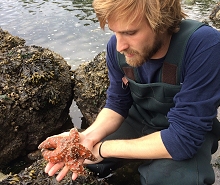
Elliot Jackson is a Ph.D. candidate in Ian Hewson’s lab in the Department of Microbiology. His research aims to combine molecular virology, genomics, and bioinformatics to discover and understand virus-host interactions in non-model systems. He currently is studying densoviruses – single-stranded DNA viruses – that infect sea stars to understand the pathogenicity of these viruses and their association with a disease known as Sea Star Wasting Disease. Support from the SBF will goes towards new diagnostic tools that will him to study these viruses and their interactions with their host in new ways both in the laboratory and in the field.
Aaron Koning (Natural Resources)

Aaron Koning is an Atkinson Sustainability Postdoctoral Fellow working with Peter McIntyre in the Department of Natural Resources, Robin Abell, Freshwater Lead at Conservation International, and Michele Thieme, Director of Freshwater Science at World Wildlife Fund. His research focuses on the potential for networks of small, community-based conservation reserves to both protect imperiled freshwater biodiversity and sustain critical inland fisheries in Southeast Asia. Funding from the SBF will enable Aaron to initiate a telemetry study of the movement of fish among conservation reserves to better understand the importance of connectivity for network-wide conservation success. Combined with ongoing community-based household harvest records, this movement data will enable development of better watershed-scale models of riverine reserves for sustainably protecting biodiversity and local livelihoods.
Anna Lello-Smith (Natural Resources)
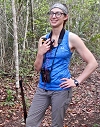
Anna Lello-Smith is a PhD student in Amanda Rodewald’s lab in the department of Natural Resources. Her research focuses on understanding the value of regenerating pasture landscapes in Guatemala’s Maya Biosphere Reserve as habitat for resident and migratory bird species, particularly species of conservation concern. She is interested in using dynamic occupancy modeling to estimate persistence of species in different habitat types along a chronosequence of regenerating pastures and adjacent mature forest as a metric of habitat quality and stability throughout the annual cycle. With support from the SBF, Anna will investigate the relative importance of local versus landscape-scale land use change in driving avian habitat use, as well as explore the extent to which the age of regenerating pastures and rainfall seasonality interact to influence avian habitat use dynamics. She will use these relationships to forecast how habitat quality and use by different species may change with projected regional drying under climate change.
Nicolas Lou (Natural Resources)

Nicolas Lou is a Ph.D. student in Nina Therkildsen’s lab in the Department of Natural Resources. He is broadly interested in the application of genomic tools in the conservation and management of biodiversity. Currently, he is working on the genomic basis of local adaptation in the Atlantic cod, as well as the molecular mechanisms underlying its rapid evolution in response to size-selective fishing and climate change. With these, he is hoping to identify potential causes of the collapse of many important cod fisheries. In addition, as a side project, he is developing practical molecular tools for the species and sex identification in non-model fish species, for the benefit of management agencies and the aquaculture industry.
Uriel Menalled (Soil and Crop Sciences)

Uriel Menalled is an MS/Ph.D. student who studies agroecology in the sustainable cropping systems lab. He is interested in elucidating the ecological mechanisms of crop-weed competition by linking crop yields to soil physiochemical properties. With SBF funding, he will study crop tolerance to weed pressure across a range of soils conditioned with different levels of cropping diversity. He will replicate this study in field soil and sterile greenhouse soil inoculated with the microbial communities of each field soil sample. Comparing weed-tolerance of field and inoculated soils will describe the implications of soil biota in establishing biodiversity-mediated crop-weed competition.
Juana Munoz (Horticulture)

Juana Munoz Ucros is a PhD candidate in Horticulture, working in Taryn Bauerle’s lab. She is studying how plants and microbes interact in the rhizosphere under drought stress, where there is potential for these interactions to improve plant growth. Specifically, she will evaluate how soil microbial communities respond to drought and tree species in a managed forest in Germany. Her research intends to better inform forest management practices to deal with climate change.
Celina Scott-Buechler (Atmospheric Science)

Growing up in India, Mexico, Germany, and the US, Celina observed from a young age the effects of human-driven change to ecosystems and the climate. As she matured intellectually, Celina began to realize the inequity of these impacts and, thus, turn her attention to the environmental justice implications of climate action: addressing environmental challenges, namely climate change, in ways that precipitate socially equitable societies. Until recently, Celina was pursuing the study and conservation of coral reefs. Her professional/academic direction changed, however, when she served on the Cornell delegation at Conference of Parties (COP23), the UN’s annual environmental summit. Immersed in the COP, she realized the great need for macro-scale, cooperative climate action that not only reduced but in fact removed carbon from the atmosphere. Since, her research has focused on the ocean’s role in negative emissions, attempting to identify climate solutions that are ecologically and socially viable. Celina is continuing this research as an MS/PhD candidate, investigating several methods of carbon dioxide removal (ocean and terrestrial), their tradeoffs, and how they can provide economic opportunity. She is especially interested in how these approaches and technologies can co-produce sustainable sources of nutrition and minimize land and water use. One such solution is Algal Bioenergy Carbon Capture and Storage (ABECCS), which relies on the mass-production of algae for biofuel production. ABECCS shows promise to meet fuel needs of heavy shipping and aviation, for which no viable sustainable alternative exists, while producing high-protein feed—all without competing for arable land or fresh water.
Steven Wilcox (Applied Economics and Management)

Steven Wilcox is a Ph.D. candidate in Applied Economics and Management. His primary interests are in agriculture and natural resources in developing and developed countries, and particularly in the relationship between land-use decisions, welfare, and conservation. Before pursuing a Ph.D., Steven worked in conservation and natural resource management for over 12 years — as a forester, habitat biologist, and agricultural advisor in the Western US, with stints in Latin America. SBF funding will support his research into the relationship between pollination input choices (e.g. wild vs. managed), the production of pollination dependent crops, and stocks of pollinators. This research seeks to empirically estimate a dynamic model of these relationships using farm-level data of apple production in NY and involves collaboration with the Dyson School and the Entomology Department.
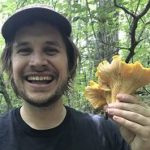
Eleven SBF recipients from Biological and Environmental Engineering, Ecology and Evolutionary Biology, Anthropology, Entomology, and Plant Biology
Kara Andres (Ecology and Evolutionary Biology)

Kara Andres is a Ph.D. student in the Department of Ecology and Evolutionary Biology, working in the lab of David Lodge. She is interested in using modern tools to understand and predict the impacts of global environmental change on the biodiversity and ecological processes in freshwater ecosystems. With support from the SBF, Kara will use environmental DNA (eDNA) techniques to characterize fish diversity and distributions in the western Amazon Basin, and she will apply this method to examine the factors governing fish biodiversity. Using this research, she will improve our understanding of how rapid and efficient species detection can be applied to sustain biodiversity and ecosystem services in riverine ecosystems.
Amy Cromartie (Anthropology)

As an archaeologist and paleoecologist, Amy’s research investigates the impacts of climate and anthropogenic forces — such as agriculture, pastoralism, and deforestation — on plant biodiversity throughout the Holocene on the Tsaghkahovit Plain, Armenia, where humans have been practicing agriculture for almost 6,000 years. She evaluates how long-term interactions between humans, climate, and plant communities have shaped the plant biodiversity seen in this region today. Amy also looks at the social-political implications of biodiversity and ecological change on the human populations that lived in this area during the Bronze and Iron Ages (3500 BC – 300 BC).
Kaitlin Deutsch (Entomology)

Kaitlin is a Ph.D. student in the Department of Entomology, working with Scott McArt. Her research is focused on pollinator disease ecology, particularly the role of non-bee insects in disease networks. With SBF funding, she will investigate the threat posed by honey bee viruses to hoverflies. While these diseases have been tied decisively to bee declines, little is known about their prevalence in, and effect on, non-bee insect pollinators. Determining whether these bee pathogens are able to infect non-bee floral visitors such as hoverflies is a vital first step in understanding the effects of pathogens on the broader pollinator community.
Katherine Eisen (Ecology and Evolutionary Biology)

Kate Eisen is a Ph.D. candidate in Monica Geber’s lab in the Department of Ecology and Evolutionary Biology. Her research explores how plants interact ecologically and evolutionarily where they share pollinators. She has been studying how pollinator sharing affects the distribution of species and the evolution of floral traits in four species of Clarkia, which are native annual wildflowers that co-occur in the southern Sierra Nevada foothills. Funding from the SBF will allow her to explore how complex floral phenotypes evolve in response to pollinator preferences by manipulating flower color, size, and orientation using 3D printing technology. This project will support our ability to conserve biodiversity in the future by generating new insights into how floral biodiversity evolved in the past.
Nick Fletcher (Ecology and Evolutionary Biology)
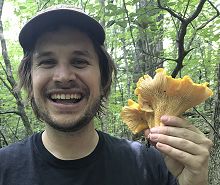
Nick Fletcher is a Ph.D. candidate in Jeremy Searle’s lab in the Department of Ecology and Evolutionary Biology. He is broadly interested in addressing questions in evolutionary biology and conservation using genomic tools. Nick’s dissertation addresses how isolation during glacial cycles and on islands drive rapid evolution in the field vole (Microtus agrestis) species complex, but he is interested in applying conservation genomics techniques to a wide variety of taxa. He will use funding from the SBF to understand what factors drive genome-wide inbreeding depression during isolation in small island populations. He is particularly interested in whether population cycling, a common phenomenon in many taxa, can accelerate the effects of inbreeding. Identifying the factors that accelerate inbreeding depression will help identify which populations may be at risk in an increasingly fragmented world.
Michael Fulcher (Plant Pathology)

Mike Fulcher is a Ph.D. candidate in Plant Pathology working with Gary Bergstrom. He studies the population biology and ecology of fungal plant pathogens that impact food production, in particular those found in both agricultural and non-agricultural landscapes. His thesis focuses on a disease of wheat and the connection between pathogen populations from grain crops and wild grasses. Funding provided by the SBF is enabling a broader inquiry into the effect of different grass host communities on the diversity of fungi that inhabit them. This work has implications for land management decisions, like the expansion of agricultural production, and our understanding of their impact on biodiversity.
Ellie Goud (Ecology and Evolutionary Biology)

Ellie Goud is a Ph.D. candidate in Jed Sparks’ lab in the Department of Ecology and Evolutionary Biology. Ellie is a plant physiological ecologist who explores the ecological and biogeochemical consequences of plant functional diversity. She is using a variety of tools during her Ph.D., including stable isotopes, gas exchange, plant anatomical measurements, and comparative phylogenetics to explore variation in plant metabolism and its role in structuring ecological communities. SBF funding will allow Ellie to test whether variation in water availability sustains plant metabolic diversity in a successional old field in Ithaca, N.Y.
Benjamin Johnson (Ecology and Evolutionary Biology)
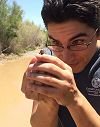
Ben Johnson is a Ph.D. candidate in Ecology and Evolutionary Biology, working in the labs of Jeremy Searle and Jed Sparks. His research combines evolutionary genetics and physiological ecology to understand the mechanisms that promote and constrain species’ adaptations to different environments. He is currently studying the influence of genetics and morphology in shaping metabolic and water balance physiology of lungless salamanders. With SBF funding he will quantify the environmental dependence of energy assimilation efficiencies in multiple salamander species to inform distribution models that will help us understand patterns of species persistence under climate change.
James Knighton (Biological and Environmental Engineering)

James Knighton is a Ph.D. student interested in using stochastic approaches applied to physically-based hydrologic models to study a diverse range of environmental issues. James’ research is currently focused on reframing riverine flooding risk from an atmospheric perspective, determining how changes in plant composition can influence flooding risk, and describing unsaturated zone dynamics through simulation of stable water isotopes. James previously worked as a professional engineer studying coastal flood risks posed for U.S. nuclear facilities.
Elizabeth Lombardi (Ecology and Evolutionary Biology)

Elizabeth Lombardi-Lizzie is a Ph.D. candidate in Sunny Power’s lab in the Department of Ecology and Evolutionary Biology. She studies plant-virus interactions across elevational and latitudinal clines with particular interest in understanding eco-evolutionary consequences of viral associations under changing climatic conditions. Support from the SBF will facilitate both exploratory and experimental field work across the native range of her focal host species, Boechera stricta. Results of her work will provide new insights into global plant virome diversity and the development of viral resistance as a quantitative trait.
Cinnamon Mittan (Ecology and Evolutionary Biology)
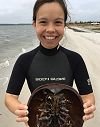
Cinnamon Mittan is a Ph.D. candidate in Kelly Zamudio’s lab in the Department of Ecology and Evolutionary Biology. She is interested in the dynamics of adaptation and evolution in invasive species, and uses Rhinella marina (the cane toad) as a model system. With a combination of fieldwork, experiments, and genomics, she studies how invasive toads in Florida have adapted to the “frigid” central Florida climate, the coldest place cane toads are found anywhere in their range. With funding from SBF, she will examine differences in gene expression between cold-tolerant and cold-intolerant toads during cold stress to further elucidate the genetic processes involved in this adaptation.

Nine SBF recipients from Ecology and Evolutionary Biology, Horticulture, Natural Resources, and Plant Biology
Lina Arcila (Ecology and Evolutionary Biology)

Lina Arcila Hernández is a PhD candidate in Anurag Agrawal’s lab in the department of Ecology and Evolutionary Biology. Overall, her research focuses on understanding how plants and insect herbivores interact and the effect of those interactions in species diversity. She is currently working with experimental and genetic approaches to determine which eco-evolutionary processes maintain the differentiation of feeding and oviposition behaviors among populations of insect herbivores. The SBF funding will allow her to test the relative importance of behavioral phenotypes, geographic isolation, and environmental clines to the population genetic structure in milkweed stem weevils (Rhyssomatus spp.). Determining the relative importance of these factors for the maintenance of population differentiation is an important step for understanding the origin of biodiversity.
Pepe Casis (Natural Resources)

Pepe Casis is a PhD student in the Department of Natural Resources and the Environment, studying environmental policy under Steven Wolf. Pepe has been an environmental economist for more than thirteen years; however, his somewhat recent disenchantment with neoclassical economics has allowed him to expand his horizons on how to design and implement environmental projects. Thus, his research is now based on environmental governance, deliberative valuation methods, and collaborative policy design; combined with neoclassical environmental economic instruments (old habits die hard). He hopes that this combination will allow him to contribute to a more realistic and humane design of economic instruments for conservation. His research focuses on the design of an environmental governance instrument based on collaboration for the Sierra Norte in the state of Oaxaca, Mexico.
David Chang van Oordt (Ecology and Evolutionary Biology)

David Chang van Oordt is a PhD student in David Winkler’s lab in the department of Ecology and Evolutionary Biology. His research focuses on the overlap of bird migration and disease ecology. He works on the effects of long distance movement on patterns of parasite diversity and evolution, and how do birds provide the means for parasite dispersal and population connectivity. He will use the SBF award to study the link between breeding and wintering site vector diversity on transmission of avian malaria in tree swallows. This will help understand the risk of infection across a bird’s migratory route based on parasite diversity, vector abundance, and migratory timing. This is especially important in the face of climate change where we expect insect phenologies and distribution ranges to shift, and it can help predict future spread and dispersal of different strains of avian malaria.
Olivia Graham (Ecology and Evolutionary Biology)

Olivia Graham is a PhD student in Dr. Drew Harvell’s lab in the Department of Ecology and Evolutionary Biology. A marine ecologist, she especially enjoys infectious disease research that has direct conservation and management applications. She currently studies the influence of environmental factors—particularly biodiversity—on the transmission, prevalence and severity of seagrass wasting disease (Labyrinthula zosterae) in eelgrass (Zostera marina). With funding from the SBF, she will use field and laboratory approaches to examine the role of eelgrass genetic diversity, bacteria, and potential invertebrate vectors in Z. marina disease dynamics. Seagrass wasting disease threatens the health of eelgrass beds worldwide, and can significantly compromise the valuable ecosystem services of eelgrass. Understanding how biodiversity and other environmental factors influence this disease is critical to effectively managing and protecting these key habitats.
Mia Howard (Plant Biology)

Mia Howard is a Plant Biology PhD student studying the chemical ecology of microbe-plant-insect interactions in André Kessler’s lab. She is studying how communities of bacteria and fungi in the soil affect the chemistry of a common native plant, tall goldenrod (/Solidago altissima/), and how these chemical changes might affect the plants’ attractiveness to insect herbivores. She is particularly interested in how microbial biodiversity in the soil might affect the diversity of goldenrod chemical phenotypes and its subsequent effects on the population’s resistance to insect attack.
Tim Lambert (Ecology and Evolutionary Biology)

Timothy Lambert is a PhD student in the Department of Ecology and Evolutionary Biology, working with Stephen Ellner, Alex Flecker, and David Lodge. He is broadly interested in the ecology and conservation of fresh waters, with an emphasis on using quantitative models to take full advantage of the information captured by isotopic, genetic, and other modern techniques. SBF funding will allow Tim to study how barriers affect the movement, diet, and growth of fish in Adirondack streams. Fragmentation of streams and other natural habitats is a major threat to ecosystems worldwide; the larger goal of this work is to help determine when and how fragmentation causes loss of biodiversity and to identify management strategies that can sustain biodiversity in spite of these changes.
Juana Munoz Ucros (Horticulture)

Juana Munoz Ucros is a PhD candidate in Horticulture, working in Taryn Bauerle’s lab. She is studying how plants and microbes interact in the rhizosphere under drought stress, where there is potential for these interactions to improve plant growth. Specifically, she will investigate the effect that different genotypes of shrub willow have on selecting the rhizosphere microbial communities.
Amelia Weiss (Ecology and Evolutionary Biology)
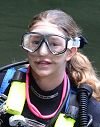
Amelia Weiss is a PhD student in Alex Flecker’s lab in the Department of Ecology and Evolutionary Biology studying the resource dynamics associated with biodiversity hotspots. She focuses on the consequences of resource subsidies, which are nutrients or energy that move between ecosystems. Her research examines how subsidies drive patterns in crustacean diversity in tropical, aquatic caves. Support from the SBF is allowing Amelia to conduct population surveys and nutrient analyses along a resource gradient in Mexican caves to examine how community composition changes under different nutrient conditions. Her aim is to understand the resource dynamics supporting these unusual hotspots of endemic biodiversity.
Marie Zwetsloot (Horticulture)

Marie Zwetsloot is a PhD student in Taryn Bauerle’s lab in the department of Horticulture. She is interested in the role of root-soil interactions in determining ecosystem services of both natural and managed ecosystems. Her dissertation research focuses on root growth dynamics and rhizosphere interactions of temperate forest tree species under global change. The SBF grant will help her study phenolic root exudate diversity among tree species and how this may influence soil carbon and nutrient cycling in forest ecosystems.

Nine SBF recipients from Ecology and Evolutionary Biology, Entomology, and Natural Resources
Natalie Bray (Entomology)

Natalie Bray is a PhD student in the Department of Entomology, studying soil arthropod ecology under Kyle Wickings. Her research focuses on the role of microarthropods in soils related to decomposition and carbon cycling, as well as microarthropods’ effects on microbial communities. She will use SBF funding to study the effects of imidacloprid, a neonicotinoid insecticide, on microarthropod communities and below-ground carbon cycling in agricultural and horticultural systems.
Samar Deen (Natural Resources)

Samar Deen is a PhD student in the Department of Natural Resources. She will use the SBF grant to study biological and economic consequences of coastal ocean acidification (OA) and rising sea surface temperature (SST) on species such as the bay scallop and the green sea urchin, both of which have considerable cultural and economic value in New England. Deen aims to understand how fisheries will respond to the synergistic effects of current and projected OA and SST under different management scenarios, as well as which management strategies are preferred by local stakeholder groups and the economic implications of alternative management responses. Her research will help inform managers about how resilience within communities can be increased by understanding the joint biological and economic consequences of alternative management strategies under projected OA and SST scenarios.
Morgan Eisenlord (Ecology and Evolutionary Biology)
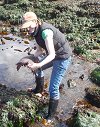
Morgan Eisenlord is a PhD student in the Department of Ecology and Evolutionary Biology. She studies disease ecology of marine organisms with Drew Harvell. Her dissertation research focuses on the host-pathogen dynamics driving differential prevalence of eelgrass wasting disease caused by Labyrinthula zosterae. Her work contributes to understanding risk factors for pathogenicity development and disease emergence in the oceans, a major threat to global biodiversity. She has identified differential virulence in L. zosterae, but the role this variation plays in the disease’s severity and potential exacerbation by environmental factors is unknown. The award from the SBF fund will support her research into virulence in L. zosterae and the pathosystem’s sensitivity to climate change.
Laura Figueroa (Entomology)
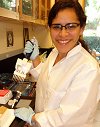
Laura Figueroa is a PhD student in the Department of Entomology, studying pathogen transmission in plant-pollinator networks with Scott McArt. She is broadly interested in applied ecological research and conservation biology of pollinators. Her research focuses on determining specific factors that influence pathogen transmission of wild bees. SBF funding will allow her to explore the relationships between pollinator visitation patterns, bee and flower functional traits, and pathogen transmission in natural systems. An objective of her research is to determine flower species that promote pollinator visitation and reduce pathogen transmission of foraging bees. These flowers could be used in supplementary plantings to boost pollinator populations near agricultural areas, along roadsides, and in urban centers.
Aubrie James (Ecology and Evolutionary Biology)
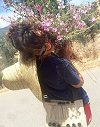
Aubrie James is a PhD candidate in Monica Geber’s lab in the Department of Ecology and Evolutionary Biology. Her research investigates how pollinator diversity and behavior affect the likelihood of flowering plants coexisting. Although specialist bee pollinators are essential to many plant species around the world, not much is known about how bee diversity changes in response to plant community diversity. With funding from the Atkinson Center, Aubrie will determine experimentally how specialist pollinators respond to different levels of diversity and abundance of plants in the genus Clarkia.
Erin Larson (Ecology and Evolutionary Biology)
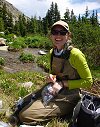
Erin Larson is a PhD candidate in Alex Flecker’s lab in the Department of Ecology and Evolutionary Biology. She studies how disturbances influence the functional composition of ecological communities, particularly macroinvertebrate communities in dynamic tropical stream systems. Macroinvertebrates are drivers and indicators of stream health, playing important roles in nutrient cycling and waste processing and linking aquatic and terrestrial food webs. Funding from the SBF will enable her to study, using both observational and experimental approaches, how quickly and in what order macroinvertebrates recolonize habitat following floods in Ecuadorian streams. The goal is to better understand the fundamental workings of Andean tropical headwater streams, which are under increasing stress from hydroelectric development in the region.
Cait McDonald (Ecology and Evolutionary Biology)

Cait McDonald is a DVM/PhD student in Kelly Zamudio’s lab in the Department of Ecology and Evolutionary Biology. Her research interests lie in the ecology and evolution of emerging infectious diseases of wildlife. Cait’s dissertation research focuses on the amphibian-killing fungus, Batrachochytrium dendrobatidis, using functional genomics techniques to identify pathogen virulence and host immune response interactions within this system. She will use funding from the SBF to identify salamander immune responses to Batrachochytrium salamandrivorans, a closely related fungus that is lethal only to salamanders. Batrachochytrium salamandrivorans was discovered three years ago in Europe, and is not currently present in the US. Identifying how this fungus affects some species, but not others, will help inform disease prevention and biosecurity strategies in the country, where salamander biodiversity is higher than anywhere else on earth.
Graciela Reyes-Retana (Natural Resources)

Graciela Reyes-Retana is a PhD student in the Department of Natural Resources, studying environmental policy under David Lee. Her research is focused on the intersection between natural resources management and socioeconomic development in developing countries. The SBF award will support a mixed-method approach to identify the factors that influence communities’ decisions to participate in forest management incentive programs in biodiversity hotspots in Mexico and analyze the perceived and observed environmental and socioeconomic outcomes of those programs.
Ryan Shipley (Ecology and Evolutionary Biology)

Ryan Shipley is a PhD candidate in the Department of Ecology and Evolutionary Biology, working with David Winkler. He is applying emergent technologies to study the ecology and life histories of animals, in particular flying vertebrates. He will use the SBF award to develop a novel radiotransmitter to track small birds and test its application in a model system. The radiotransmitter will allow him to study how tree swallows’ pre-migratory body condition affects their movement decisions during migration and may result in long-lasting carryover effects. A thorough understanding of how migratory animals respond to a changing environment is vital as they face a world with increasing human influence.

Seven SBF recipients from Animal Health Diagnostic Center, Anthropology, Earth and Atmospheric Sciences, Ecology & Evolutionary Biology, Natural Resources, and Shoals Marine Lab
Rachel Abbott (Ecology & Evolutionary Biology)
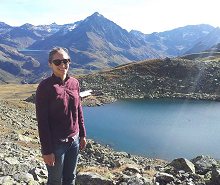
Rachel Abbott is a PhD student studying zooplankton biogeography with Dr. Nelson Hairston, Jr. in the Department of Ecology & Evolutionary Biology. Her dissertation work focuses on determining mechanisms for commonness by defining biotic and abiotic factors that influence how copepod zooplankton are distributed across landscapes. Funding from the SBF will go towards determining the role of predation on copepod biogeography by measuring environmental DNA to detect zooplanktivorous fish populations and their diets in Adirondack Mountain Lakes
James Burtis (Natural Resources)

James Burtis is a PhD student in the Department of Natural Resources working under Dr. Joseph Yavitt. His research focuses on the ecology of Ixodes scapularis (Blacklegged tick), the primary vector of Lyme disease, and many other tick borne diseases. Tick borne disease research has focused predominantly on disease transmission cycles during peaks in tick activity. James hopes to explore the impact of the soil ecosystem on tick survival during the inactive periods which make up the majority of the I. scapularis life cycle. An improved understanding of their position within the soil ecosystem will lead to better informed management practices. James also hopes to identify naturally occurring biological control agents within the soil ecosystem that maybe used for management purposes in the northeastern United States. He will use his SBF funding to rear ticks labeled with stable isotopes and track their isotopic signature through the soil ecosystem in areas with variable natural tick densities.
Stephen Durham (Earth and Atmospheric Sciences)

Stephen Durham is a PhD candidate in the Department of Earth and Atmospheric Sciences studying paleoecology and conservation paleobiology under Gregory Dietl. His research is focused on examining climate-related changes in lifespans of the Eastern oyster using fossil and Recent oyster shell assemblages. The award from SBF will support geochemical analyses of fossil and Recent oyster shells to estimate paleoenvironmental variables, such as temperature and salinity, and establish size-at-age relationships for both fossil and Recent oysters.
Nick Mason (Ecology & Evolutionary Biology)
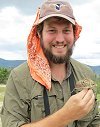
Nick Mason is a PhD candidate in Irby Lovette’s lab in the Department of Ecology and Evolutionary Biology and the Fuller Evolutionary Biology Program at the Cornell Lab of Ornithology. He is broadly interested in studying the evolutionary and ecological processes that shape biodiversity, particularly in birds. Funding provided by SBF will allow him to study how a century of desert agriculture has affected adaptive phenotypes, demography, and diet within a native population of horned larks in the Imperial Valley of southern California. His work integrates phenotypic and genomic data from museum specimens, remote sensing data, and stable isotope analyses to elucidate how populations persist and adapt to selective pressures imposed by land use, which is increasingly important for sustaining biodiversity amid human population growth.
Tim McLellan (Anthropology)

Tim McLellan is a PhD candidate in the Anthropology department. The SBF grant will be used to study non-timber forestry products in Yunnan Province, China. In particular, Tim is interested in how the introduction of new cash crops will affect the harvesting of forest resources, and what such changes might mean for biodiversity conservation in the region.
Rob Ossiboff (Animal Health Diagnostic Center)
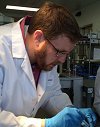
Rob Ossiboff is postdoctoral research associate working with Dr. Elizabeth Bunting and the New York State Cooperative Wildlife Health Program at the College of Veterinary Medicine’s Animal Health Diagnostic Center. Dr. Ossiboff is a veterinary pathologist with graduate training in infectious disease research who has a specific interest in disease and pathology of reptiles and amphibians. Funding from the SBF will be used in studies examining the immune and protective responses of eastern hellbenders (Cryptobranchus alleganiensis), a species of giant salamander endemic to Eastern North American, following exposure to chytrid (Batrachochytrium dendrobatidis) fungus. The goals of the studies are to bolster reintroduction projects of this species of threatened amphibian as well as to gain a better understanding of the immune response to chytrid fungus in amphibians.
Katie Sirianni (Shoals Marine Lab)

Katie Sirianni is a Ph.D. candidate studying community and metacommunity dynamics. In nature, communities rarely exist in isolation and are instead connected to other communities by dispersal, forming a network known as a metacommunity. Metacommunities are also formed when humans fragment habitats such as forests. Though ubiquitous, metacommunity dynamics are often difficult to study because they can occur at a large spatial scale. To avoid this problem, Katie carries out her research in a remarkable natural plankton metacommunity made up of over 4000 small rock pools at Shoals Marine Lab on Appledore Island, ME. Funding from the SBF will help her to determine whether the zooplankton in these pools compete, if they are able to coexist within each pool, and how their presence in a pool is mediated by dispersal. This research has implications for other less tractable metacommunities.
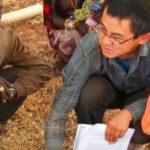
Nine SBF recipients from Crop and Soil Sciences, Ecology & Evolutionary Biology, Entomology, and Natural Resources
Heather Connelly (Entomology)

Heather Connelly is a third year PhD candidate studying landscape ecology and ecosystem services in agriculture with Greg Loeb in the Department of Entomology. Her research examines the impact of different land uses and farm management on the composition of beneficial insect communities including both pollinators and natural enemies in terms of abundance and species richness as well as community phylogenetic diversity. An important aspect of her work is measuring the relative contribution of native pollinators to crop yield under varying landscape contexts. One specific aim of her research is to examine the potential for native perennial wildflower plantings to support resilient pollinator and natural enemy communities on farms in the Finger Lakes Region.
Gemara Gifford (Natural Resources)

Gemara Gifford is a Master’s student in Natural Resources and the Cornell Lab of Ornithology’s Conservation Science Program under the direction of Dr. Amanda Rodewald. Her research takes place in the Guatemalan Highlands, a landscape with diverse agroecosystems and cloud forests that support indigenous Q’eqchi’ Maya communities, as well as an impressive amount of bird biodiversity. Her research aims to identify the trade-offs between bird conservation and the ability of different agricultural systems (traditional and non-traditional, monocultures vs. polycultures) to provide important provisioning services, like foods and fibers, to local communities. Specifically, she aims to identify practices that optimize bird conservation and the ability of local communities to meet their nutritional and economic needs. Working with Dr. Miguel Gomez in Applied Economics and Management, this project will also consider food value-chains and economic viability of different agricultural practices. Gem is a Bill and Melinda Gates Millennium Scholar, and a first-generation student.
Darragh Hare (Natural Resources)

Darragh Hare is a PhD candidate in the Blossey Lab in the Department of Natural Resources. He studies the evolution of ownership and how different ownership types constrain or enable environmental conservation. He will use his SBF award to gather data on how wild life ownership is interpreted differently in jurisdictions that have laws or policies based on public trust thinking.
Abigail Hart (Natural Resources)

Abigail Hart is a graduate student in the field of Natural Resources. Her research focuses on how multi-stakeholder groups negotiate competing claims on land and natural resources. Specifically, she is interested in these processes in landscapes being managed for multiple objectives, including biodiversity conservation, agricultural production and human livelihoods and well-being, and if integrated approaches to landscape management are yielding a wider set of benefits that other approaches. This funding is allowing her to pursue this research in two forest dominated landscapes actively managed by multi-stakeholder bodies for biodiversity conservation, among other objectives under an integrated management approach called the Model Forest Framework.
Rachel Hestrin (Crop and Soil Sciences)

Rachel Hestrin is a PhD student in Dr. Johannes Lehmann’s lab in the Department of Crop and Soil Science. She is interested in plant-microbe interactions, rhizosphere ecology, and terrestrial biogeochemistry in both natural and agricultural systems. The SBF small grant will help her investigate how different soil microbial communities facilitate plant nitrogen uptake.
Chuan Liao (Natural Resources)
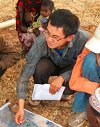
Chuan Liao is a PhD candidate in the field of Natural Resources. He is interested in rangeland socio-ecological system and pastoral livelihoods. He conducts his dissertation fieldwork in Borana, Ethiopia, a pastoral area that has long been subject to various external interventions and environmental challenges. Specifically, he studies phenology of rangeland vegetation, pastoralists’ ethno-botanical knowledge, and livestock resource selection pattern. He closely engages the indigenous pastoral communities in his research, and collaborates with International Livestock Research Institute and the National Herbarium of Ethiopia based in Addis Ababa University.
Maya Lim (Ecology and Evolutionary Biology)

Maya Lim is a graduate student in the Department of Ecology & Evolutionary Biology. She researches how soil metal/metalloid content shapes interactions between plants and insects. The funds provided by SBF will allow her to study how plant arsenic uptake may alter competition between plants and affect interactions with herbivorous insects. Her work will involve a field component at a local site polluted with arsenic.
Lauren Snyder (Ecology and Evolutionary Biology)

Lauren Snyder is a PhD. student working with Dr. Alison Power in the Ecology & Evolutionary Biology Department. She is interested in using ecological principles to develop sustainable agricultural practices. Currently, Lauren is working in the local food system to understand how intraspecific crop diversity influences important ecosystem services, such as pest suppression and increased crop yield. Funding from the SBF will allow her to integrate tools from ecology and economics to identify profitable pest management strategies for small-scale farmers in NY State.
Allison Tracy (Ecology and Evolutionary Biology)

Allison Tracy is a Ph.D. student studying coral disease outbreaks in the Department of Ecology and Evolutionary Biology. She is generally interested in the modulation of host-pathogen interactions by environmental stressors and is currently focusing on the role of temperature stress and chemical pollution in coral diseases. Research that assesses diverse stressors and the potential for interactive effects is critical for understand the rising incidence of disease on many coral reefs. Allison will combine her field research with a study of public awareness of the consequences of marine diseases to identify and resolve gaps between scientific research and public knowledge. In combining these approaches, she hopes to leverage effective science communication to support conservation.
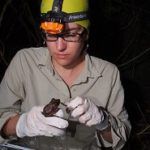
Seven SBF recipients from (Applied Economics and Management), (Biological and Environmental Engineering), Earth and Atmospheric Sciences, Ecology & Evolutionary Biology, and Natural Resources
Sahas Barve (Ecology and Evolutionary Biology)

Sahas Barve is a graduate student in the Department of Ecology and Evolutionary Biology. He works with Professor Andre Dhondt. Sahas’ research focuses on understanding the determinants of altitudinal range in montane birds. He plans to simultaneously test the importance of factors like interspecific competition and physiology in shaping Himalayan bird communities shedding light on the processes that facilitate biodiversity hotspots in supporting high species richness. The research on avian physiology will help us in determining a species’ ability to adapt to the incumbent climate change. For this work, he will collaborate with Indian research institutes and engage Indian graduate students and local people in his research.
Elliot Friedman (Biological and Environmental Engineering)

Elliot Friedman is a PhD candidate in the Angenent Lab. His research focuses on the roles of dissimilatory metal-reducing bacteria in biogeochemical cycles; specifically, he is interested in combining bioelectrochemical sensors, high-throughput sequencing, environmental measurements, and multivariate statistics to further our understanding of crucial ecosystem processes. He has been working in tundra ecosystems near Barrow, Alaska to understand the effects of continued climate change on subsurface microbial processes in high-latitude peat soils. He plans to extend his work to other terrestrial and aquatic ecosystems with the goal of elucidating the links between microbial community structure and ecosystem function.
Teevrat Garg (Applied Economics and Management)

As a graduate student in the Dyson School of Applied Economics and Management, Teevrat is primarily concerned with the economics of environmental degradation in low and middle-income countries. In particular, he is understanding the link between incomes and the provision of environmental public goods such as forests and coral reefs. Teevrat is working with an interdisciplinary team of professors and graduate students in Applied Economics, Ecology & Evolutionary Biology and Earth & Atmospheric Sciences to analyze how economic growth in coastal regions of Indonesia affects marine health. This is part of his broader research that examines whether, as communities become richer, there exist tradeoffs or synergies across different environmental public goods.
Ted Lawrence (Natural Resources)

Ted Lawrence is a Ph.D. student in the field of Natural Resources. His research investigates how the resilience of social-ecological systems and ensuing biodiversity is affected by different natural resource management regimes (communal versus private property-based). His research sites are in Yucatan Mexico, which is the part of the Mesoamerican forests, the 3rd largest among the world’s hotspots for biodiversity and tropical deforestation. His research question is “how do measured outcomes (i.e., spatial pattern and scale of development, land use, land cover, and agriculture) differ across Yucatan, Mexico between Mayan communities with communal versus private natural resource management regimes when both types of communities are exposed to similar external shocks (e.g., structural changes in the global to regional economic, political, socio-cultural and ecological systems)?”.
Ana Longo (Ecology and Evolutionary Biology)
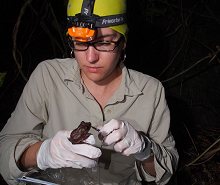
Ana V. Longo is a Ford Fellow conducting her doctoral studies under the mentorship of Dr. Kelly Zamudio in the Department of Ecology and Evolutionary Biology. She is interested in understanding the factors contributing to seasonal changes in host-pathogen dynamics in direct-developing frogs that are declining in their native Puerto Rico. The funds provided by the SBF will allow her understand how skin microbial communities vary with time, and test their stability and resilience to environmental changes and disease.
Paul Simonin (Natural Resources)

Paul is a PhD candidate in the Natural Resources field. His research is primarily focused on the interaction between spatial ecology and predator-prey dynamics in fish communities, and he is studying how changing gradients in the abiotic environment of lakes (e.g., water temperature) affect fish distribution patterns and subsequent trophic relationships. Paul is also interested in how these spatial community ecology questions relate to human use of aquatic and fisheries resource.
Jansen Smith (Earth and Atmospheric Sciences)

Jansen Smith is a PhD student studying conservation paleobiology with Dr. Gregory Dietl in the Department of Earth and Atmospheric Sciences. He studies species interactions in the recent past and fossil record to examine what the past can tell us about the state of nature before human impacts. His overarching research interest is in applying paleontological data and approaches to ecosystem restoration and biodiversity conservation.

Nine SBF recipients from Earth and Atmospheric Sciences, Ecology & Evolutionary Biology, Entomology, and Plant Pathology
Gui Becker (Ecology and Evolutionary Biology)

Gui Becker is a PhD student in the Department of Ecology & Evolutionary Biology. His research interests fall at the interface of spatial ecology and wildlife epidemiology, investigating how different patterns of deforestation influence amphibian migration, and how discontinuities between terrestrial and aquatic habitats (habitat split) affect amphibians with different life-history traits. He also builds spatial models and conduct field experiments to understand biotic and abiotic mechanisms behind amphibian declines caused by emerging infectious diseases.
Ian Brosnan (Ecology and Evolutionary Biology)

Ian Brosnan is a PhD candidate in Dr. Chuck Greene’s Ocean Resources and Ecosystems Lab. His research focuses on using marine acoustic telemetry and agent-based modeling to study movement, and habitat preferences of commercially and socially valuable fish species.
Courtney Couch (Ecology and Evolutionary Biology)

As a PhD candidate in Ecology and Evolutionary Biology, Courtney Saltonstall Couch applies a multidisciplinary approach to obtain a holistic understanding of the processes affecting coral health along the West coast of Hawaii. Her research focuses on three questions: What are the spatiotemporal patterns in overall coral health and disease? What are the roles of terrestrial input, local hydrology and host demographics in these disease patterns in the dominate reef building species? Is coral-associated microbial diversity and abundance affected by local environmental conditions?.
Ellen Crocker (Plant Pathology)

Ellen Crocker is a graduate student in Prof. Eric Nelson’s lab in the Department of Plant Pathology and Plant-Microbe Biology. She is interested in how plant pathogens shape plant community dynamics in natural ecosystems. Her research focuses on the roles of pathogens in the success of invasive plant species and seeks to better understand how pathogen community dynamics contribute to plant-soil feedbacks and apparent competition between plant species.
Ben Freeman (Ecology and Evolutionary Biology)
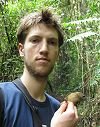
Ben Freeman is a graduate student in the Department of Ecology and Evolutionary Biology working with Professor John Fitzpatrick. His research investigates why tropical mountains are biodiversity hotspots. He focuses on examining the complex ecological processes such as competition, predation and habitat selection that limit elevational distributions of montane birds; this information will allow him to predict the impact of climate change on bird communities.
Erin Meyer-Gutbrod (Earth and Atmospheric Sciences)

Erin Meyer-Gutbrod is a PhD student working with Dr. Charles Greene in the Ocean Science and Technology concentration in the Department of Earth and Atmospheric Sciences. She is currently modeling prey-dependent reproduction in cetaceans to define benchmarks in prey abundance that support population growth. Erin is also working on an ocean instrumentation project implementing echosounders onto an unmanned ocean sensing vehicle for use in fisheries acoustics surveys.
Renee Petipas (Ecology and Evolutionary Biology)
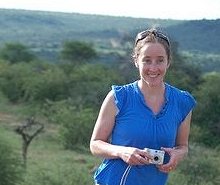
Renee Petipas is working with Dr. Monica Geber in the Ecology and Evolutionary Biology Department. Renee’s research focuses on how arbuscular mycorrhizal fungal (AMF) communities help plants withstand biotic and abiotic stress. Previously, Renee worked in Kenya examining how AMF mitigate the impacts of two common plant stressors: drought and ungulate herbivory. She plans to return to Kenya this summer to examine how grazing intensity impacts both plant and fungal diversity.
David Rodriguez (Ecology and Evolutionary Biology)

Dr. David Rodriguez is a NSF Minority Postdoctoral Fellow under the direction of Professor Kelly Zamudio, in the Department of Ecology and Evolutionary Biology. His research focuses on the population genomics of the frog-killing fungus (Batrachochytrium dendrobatidis [Bd]), which causes the disease chytridiomycosis and is partly responsible for global amphibian declines. He seeks to describe the population dynamics of Bd in Central and South America using genomic data. The results of his research will assist managers in amphibian conservation efforts and disease mitigation
Nathan Senner (Ecology and Evolutionary Biology)
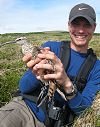
PhD Candidate Nathan Senner works with Dr. John Fitzpatrick in the Department of Ecology and Evolutionary Biology and at the Cornell Laboratory of Ornithology. His research focuses on how global climate change is altering the ability of long-distance migratory birds to successfully complete their annual cycles. He is particularly interested in understanding what management and conservation efforts can be used to enable migratory birds to track the changes in resource phenology that they encounter during their travels across the globe each year and learning at what spatial and temporal scales these species are being most directly effected by climatic change.
